In proclaiming the faith and in administering the sacraments every priest speaks on behalf of Jesus Christ, for Jesus Christ.
Distinction Matter - Subscribed Feeds
-
Site: RT - News
Allies and adversaries alike have denounced the massacre at the Crocus City Hall concert venue
Governments around the world have condemned the act of terrorism at the Crocus City Hall concert venue outside Moscow on Friday evening, in which at least 60 people were killed and over 100 injured.
Messages of condolences and support for the Russian people – as well as condemnations of the yet-unidentified perpetrators – began arriving in Moscow shortly after the attack.
“Cuba condemns the monstrous terrorist act committed in the Moscow region,” said President Miguel Diaz-Canel, sending condolences to the Russian government and people for the loss of life and wishing those injured a speedy recovery.
“Republic of Srpska strongly condemns the terrorist attack in Moscow this evening, which harmed dozens of innocents,” said Milorad Dodik, president of the Serb entity in Bosnia-Herzegovina. “Such attacks are a reminder to us all never to stop fighting against terrorists, who are the common enemy of the civilized world.”
President Nicolas Maduro of Venezuela condemned the “atrocious armed attack perpetrated against innocent civilians” and sent a message of solidarity to Russian President Vladimir Putin, and the “brotherly people of the Russian Federation, certain that they will face this bitter moment with unity.”
Read more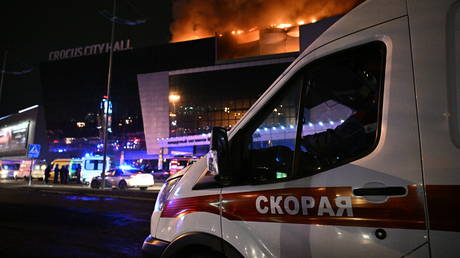 Gunmen attack mall near Moscow, at least 60 dead (VIDEOS)
Gunmen attack mall near Moscow, at least 60 dead (VIDEOS)
“Kazakhstan strongly condemns the terrorist act against civilians in Moscow,” said President Kassym-Jomart Tokayev. “There can be no justification for terrorism,” he added, offering help from Kazakhstan’s law enforcement agencies if needed.
Bolivia “condemns in the strongest possible terms” the terrorist attack in Moscow, said President Luis Arce. “This tragic event must be condemned by the entire international community.”
Turkish Foreign Minister Hakan Fidan phoned his Russian counterpart Sergey Lavrov to convey President Recep Tayyip Erdogan’s condolences and the “unconditional condemnation of the bloody terrorist attack.”
“We are following with deep pain what is happening in Moscow,” said the Foreign Ministry of Belarus. “This heinous act of terrorism cannot be justified. We stand with the fraternal Russian people in these difficult moments.”
“The murder of unarmed people who came to spend a Friday evening in an entertainment center is unjustified barbarity and cruelty,” Minsk added. “We are confident that everyone involved in this crime will receive the punishment they deserve.”
The Foreign Ministry of Armenia said the country was “shocked by the terrifying news about the inhuman terrorist attack in Moscow,” mourned the loss of life and wished those injured a speedy recovery.
Read more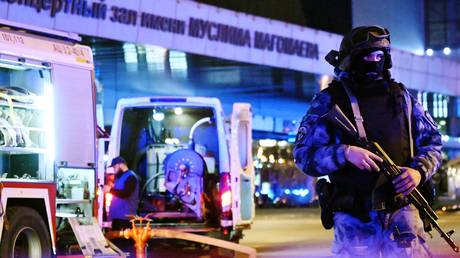 Moscow cancels all mass events after shooting
Moscow cancels all mass events after shooting
“We strongly condemn the monstrous attack” in Moscow, said the Foreign Ministry of Azerbaijan. “We express our deepest condolences to the families of the innocent victims, as well as the people and government of the Russian Federation.”
Uzbekistan strongly condemned the attack as well. “There can be no justification for terrorism,” the Foreign Ministry in Tashkent said. “We call for unanimous rejection of this kind of violence against innocent citizens.”
“We strongly condemn this terrible attack committed at a concert hall in Moscow,” the Pakistani Foreign Ministry said. “In this difficult hour, we stand in solidarity with the people and the government of the Russian Federation.”
“The Arab Republic of Egypt reaffirms its strong condemnation and total rejection of all forms of violence and terrorism, expressing its full solidarity with the Russian Federation in this delicate situation,” said the Foreign Ministry in Cairo.
In its message to Moscow, the Qatari Foreign Ministry noted that “the Emirate resolutely rejects methods of violence and terrorism, whatever the motive.” Condemnations of the attack and condolences to the victims also came from Iran and Nicaragua.
Read more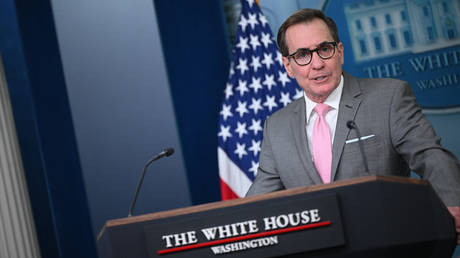 US condemns Moscow terrorist attack
US condemns Moscow terrorist attack
The EU was “shocked and appalled by the reports of a terrorist attack in the Crocus City Hall in Moscow,” said the bloc’s spokesman Peter Stano in a statement posted on X (formerly Twitter). “The EU condemns any attacks against civilians. Our thoughts are with all those Russian citizens affected.”
The US has expressed condolences to victims of the “terrible shooting attack,” National Security Council spokesman John Kirby told reporters at the White House press briefing in Washington. Kirby said that Washington was still gathering information about the attack, but insisted there was “no indication” that Ukraine was involved, or that the March 7 security alert – issued by the US Embassy in Moscow, warning about a possible attack by “extremists” – was in any way related to Friday’s incident.
Chinese President Xi Jinping has expressed his condolences to his Russian counterpart Vladimir Putin and the families of the victims over the “serious terrorist attack” on Crocus City Hall, Russia’s embassy in Beijing announced, citing a message from the Chinese leader. Xi said he was “shocked” by what happened.
”China opposes terrorism in all its forms, strongly condemns terrorist attacks, and firmly supports the efforts of the Russian government to ensure national security and stability,” the Chinese president said.
Cyprus is “shocked by the tragic news” of the terrorist attack on Crocus City Hall, the island nation’s foreign ministry has said in a statement on X (formerly Twitter). It expressed condolences to the families of the victims, adding that the Cypriot authorities “strongly condemn the attack against civilians.”
-
Site: RT - News
The Princess of Wales said the cancer was found through post-operative tests after a major abdominal surgery
Kate Middleton has announced that she is in the “early stages” of chemotherapy treatment after cancer was found following an abdominal surgery which she underwent in January.
Speculation and conspiracy theories have swirled for weeks about the 42-year-old Middleton’s two-month disappearance from the public eye and royal duties.
In a video statement on Friday, Middleton said that while her condition was thought to be non-cancerous, cancer was found to be present after further post-operative testing.
She explained that her medical team had since advised her to undergo “a course of preventative chemotherapy,” which she understood to have begun last month. She did not disclose the type of cancer, but said she is “well and getting stronger every day.”
Addressing her lengthy and unusual absence from the public eye, Middleton said it had “taken time” to explain her diagnosis to her three children with Prince William and asked for privacy while she continues treatment.
Kensington Palace said it would not be sharing any further information on the Princess of Wales’ medical condition, including the type of cancer.
A message from Catherine, The Princess of Wales pic.twitter.com/5LQT1qGarK
— The Prince and Princess of Wales (@KensingtonRoyal) March 22, 2024Middleton’s father-in-law, King Charles, also shared a cancer diagnosis earlier this year. Charles’ cancer was found during examination for benign prostate enlargement, Buckingham Palace said at the time, also without revealing the form of cancer.
Sympathy for Middleton poured in on Friday, with UK Prime Minister Rishi Sunak posting a statement on X (formerly Twitter), saying his thoughts were with the Princess of Wales and her family, praising her “tremendous bravery” in speaking publicly about her diagnosis.
READ MORE: Trump hints he would deport Prince Harry
Meanwhile, White House press secretary Karine Jean-Pierre told reporters in Washington that the administration “wishes her a full recovery.”
“Our thoughts are with the Duchess of Cambridge and her family members and friends during this incredibly difficult time,” she said.
-
Site: RT - News
The move is aimed at promoting and protecting human rights in the context of the rapidly developing technology
The UN General Assembly on Thursday unanimously adopted the first global AI-related resolution aimed at promoting and safeguarding human rights in the context of digital technologies.
Proposed by the US and co-sponsored by more than 120 countries, the non-binding resolution was endorsed by all 193 UN member nations. According to a statement on the UN website, it establishes the principles of development and the use of “safe, secure and trustworthy” AI systems.
”The improper or malicious design, development, deployment and use of artificial intelligence systems … pose risks that could … undercut the protection, promotion and enjoyment of human rights and fundamental freedoms,” the statement reads.
The UNGA pointed to the “varying levels” of technological development among and within countries, noting that developing nations face certain challenges in keeping up with the rapid pace of innovation.
Speaking before the adoption, US Ambassador and Permanent Representative to the UN, Linda Thomas-Greenfield, said the international community had a responsibility “to govern this technology rather than let it govern us.”
Read more British state media looking to develop its own AI
British state media looking to develop its own AI
“So let us reaffirm that AI will be created and deployed through the lens of humanity and dignity, safety and security, human rights and fundamental freedoms,” Thomas-Greenfield said.
The UNGA resolution is the latest in a series of initiatives by governments across the world to shape the development of AI amid growing concerns over the potential for abuse of the technology.
Earlier this month, the EU passed a landmark AI law aimed at ensuring the fast-changing technology remains safe and in compliance with fundamental human rights but also boosts innovation. The regulation is expected to enter into force at the end of the legislature in May, after passing final checks and receiving endorsement from the European Council.
Some countries, including China and India, have also been issuing guidelines for regulating the technology. In October, US President Joe Biden issued an executive order to reduce AI risks to consumers, workers, and minority groups while bolstering national security.
-
Site: RT - News
There is “no indication” that the attack has any connection to Ukraine, National Security Council spokesman John Kirby has said
The White House has condemned a major terrorist attack outside Moscow which unfolded on Friday evening, as masked gunmen breached a concert hall northwest of the Russian capital, leaving scores dead and injured.
Unofficial reports indicate that at least a dozen people have been killed in the attack at the Crocus City Hall, with around 130 wounded, after the gunmen opened fire at the venue and detonated explosives which set the building ablaze.
Speaking to reporters at a briefing in Washington, National Security Council spokesman John Kirby said the White House sent condolences to the victims of the “terrible” attack, adding that they were trying to gather more information on the incident.
“Our thoughts are with the victims of this terrible shooting attack,” Kirby said. “The images are just horrible and just hard to watch.”
Read more Gunmen attack mall near Moscow, at least 60 dead (VIDEOS)
Gunmen attack mall near Moscow, at least 60 dead (VIDEOS)
Kirby quickly dismissed any speculation about a potential “connection to Ukraine,” saying there is “no indication” that Ukrainians were involved.
He also addressed questions about a March 7 security alert issued by the US Embassy in Russia, which had warned that “extremists” had plans for an imminent attack in Moscow.
“I don’t think that was related to this specific attack,” Kirby said.
According to TASS news agency, up to a third of the Crocus City Hall complex has been engulfed in flames, with unconfirmed reports and videos indicating that helicopters have been dispatched to extinguish the fire. The agency also said that special forces soldiers from the Russian Guard have arrived at the location.
-
Site: RT - News
Women in Sweden now give birth to 1.45 children on average during their lifetime
Sweden’s total fertility rate – the number of children an average woman gives birth to during her lifetime – sank to a record low in 2023, and is on course to plunge further this year, Sveriges Television (SVT) reported on Friday, citing Statistics Sweden.
According to the report, the rate was 1.45 children per woman last year, the lowest since records began in 1749. The number of births in 2023 was the smallest since 2003, when the total population was nearly 1.6 million fewer than the current 10.5 million.
“There has been a downward trend since 2010. We see that it occurs throughout the country and both among women who were born in Sweden and who immigrated from abroad,” Guadalupe Andersson, an analyst at Statistics Sweden, told the broadcaster.
January 2024 data showed that the downward trend is continuing. Only 7,900 children were born across the country in the first month of the year, 350 fewer than in January 2023.
“We seem to be on our way to a new low... The reason is unclear,” analysts said.
Several women who spoke to SVT said they were hesitant to become parents. Most cited climate change and the threat posed by conflicts around the world as the cause of their reluctance.
READ MORE: French birth rate lowest since WWII
The TV channel noted that the consequences of the low birth rate are being felt across the country. Several preschools have recently announced they will not be reopening next fall, and will have to lay off staff. Also, over the longer term, fewer able-bodied people will be able to support Sweden’s growing elderly population, analysts warn.
-
Site: RT - News
The BBC has revealed plans to build and train its own artificial intelligence model to support its production process
UK national broadcaster BBC has announced it is drawing up plans to create its own artificial intelligence model based on its vast text archives, hoping the technology will help improve its production process.
Earlier this month, the BBC’s director of nations Rhodri Davies told a House of Lords committee that the broadcaster was considering developing an AI program, but was still deliberating as to whether to develop it unilaterally or in partnership with another company.
On Thursday, another spokesperson for the company confirmed the plans in a statement cited by Reuters, saying that the BBC was indeed looking to use its 80-years worth of audio, video and text content to train the program.
The broadcaster stressed, however, that the output of such a model would not be shared with any third parties and would only be used internally.
Read more EU passes landmark AI law
EU passes landmark AI law
However, Financial Times has reported, citing sources within the organization, that the BBC was reportedly in negotiations about selling access to its large library to outside companies to help them develop their own language models.
The BBC has denied the claims, stating that it “has no agreement with any organization to use its archive to train their large language models that power generative AI tools for commercial use.”
The company’s statement comes as a number of large media organizations have already accepted lucrative deals to sell their journalistic archives to the likes of OpenAI to help train their AI programs.
In another statement issued last month, the BBC also stated it was already experimenting with the use of artificial intelligence in its newsroom, but had established certain rules to ensure that anything published would still have human oversight.
As an example, the broadcaster said that it has used AI to come up with summaries to articles and recommendations for headlines for a story. The BBC stressed, however, that the final decision as to what to publish still rests with journalists.
-
Site: RT - News
The temporary measure was included in a massive government funding bill
American embassies around the world will not be able to fly the rainbow, Progress or Black Lives Matter banners this summer, Bloomberg has reported. The White House agreed to the prohibition to get a $1.2 trillion spending bill through Congress.
The bill, passed on Friday morning, keeps the US government open through September 30, the end of the 2024 fiscal year.
The spending deal has been heavily criticized by some Republican legislators, who argued that it funds all of the ruling Democrats’ priorities and removes any policy leverage from the House of Representatives.
House Speaker Mike Johnson – a Louisiana Republican – has presented the flag amendment as a major victory. Meanwhile, the Democrats have used it to accuse the GOP of being mean and “homophobic.”
“[The] Republican Party loves nothing more than to demagogue at the expense of LGBTQ Americans,” Congressman Ritchie Torres of New York said on Friday. “I support funding the federal government. So we’re held hostage by the extremism of the Republican Party.”
Read more ‘LGBT movement’ added to Russia’s terrorist list
‘LGBT movement’ added to Russia’s terrorist list
One Democrat familiar with the deal told Bloomberg that the ban applies to any banners other than the national flag, exempts the POW-MIA banners traditionally flown to commemorate missing prisoners from the Vietnam War, and does not apply to “embassy officials’ personal use.” It would also expire on September 30, along with the spending bill.
Washington’s embrace of the Pride flag dates back to the first term of President Barack Obama and Hillary Clinton’s tenure at the State Department (2009-2013). The Trump administration (2017-2021) reserved the official flagpoles for Old Glory alone, but did not stop embassies from flying the rainbow banner as a provocation – in Moscow in June 2020, for example.
Since 2021, however, the State Department has promoted both the Pride flag and the Black Lives Matter banner, both at embassies abroad and at its Washington headquarters.
In May 2021, the Republicans proposed the ‘Stars and Stripes Act’ that would ban any other flags from official embassy flagpoles. The following month, the US embassy to the Vatican hung a massive Pride flag on the outside of its building and boasted about it on social media, insisting that “LGBTQI+ rights are human rights.”
-
Site: RT - News
Berlin has joined a Czech-led initiative to buy 800,000 artillery rounds for Kiev
Germany has pledged to donate another €300 million ($326 million) as part of a Czech-led initiative to purchase artillery rounds for Ukraine, Bloomberg has reported, citing anonymous sources familiar with the decision. Czech President Petr Pavel unveiled the scheme at the Munich Security Conference in mid-February, setting the target at 800,000 shells.
In recent weeks, Ukrainian officials have increasingly been sounding the alarm over the country’s dwindling ammunition stockpiles due to which Kiev’s troops have been badly outgunned on the front line.
The shortages have intensified amid a months-long deadlock in the US Congress where the Republicans have been refusing to give the green light to President Joe Biden’s foreign aid package that envisages $60 billion for Kiev. Ukrainian President Vladimir Zelensky has also accused the EU of failing to deliver on a pledge to deliver a million shells by March.
On Thursday, Bloomberg said that Germany’s contribution to the initiative would cover the purchase of approximately 180,000 shells – the same estimate as the one given on Tuesday by the country’s defense minister, Boris Pistorius.
Read more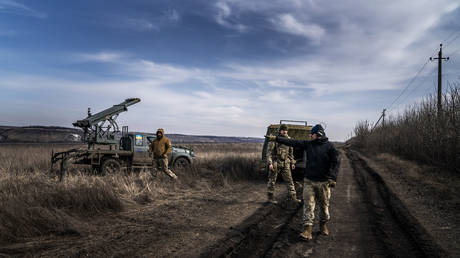 EU approves more money for Ukraine aid fund
EU approves more money for Ukraine aid fund
Berlin’s participation in the initiative was confirmed earlier this month by German government spokesperson Steffen Hebestreit.
A separate defense aid package for Ukraine unveiled by Pistorius on Tuesday is worth €500 million ($543 million), and includes 10,000 artillery shells from Bundeswehr (German military) stocks, as well as 100 infantry vehicles and 100 unarmored vehicles.
Germany is Ukraine’s second-largest Western backer, second only to the US. To date, Berlin has donated €17.7 billion in military aid for Kiev, according to estimates by the Kiel Institute for the World Economy.
As for the push to purchase artillery shells spearheaded by Prague, 18 nations have so far committed to it, including Canada, the Netherlands, France, Denmark and Belgium.
READ MORE: Russia is at war – Kremlin
Earlier this week, Czech Foreign Minister Jan Lipavsky revealed that Prague had secured 300,000 artillery rounds, with media reports claiming that those could be delivered to Ukraine by June.
Under the scheme, the Czech Republic raises money and acts as a middleman sourcing the ammunition from countries outside of the EU that are reluctant to supply the rounds directly to Ukraine.
The Kremlin has repeatedly warned that the ever-growing involvement of Western countries in the Ukraine conflict could result in an all-out confrontation between NATO and Russia. Moscow also insists that weapons deliveries will not change the outcome of the conflict but merely prolong the hostilities.
-
Site: RT - News
Moscow is the problem but Ukraine can put a stop to it “once and for all,” the Swedish foreign minister has claimed
Sweden is determined to confront Russia as part of NATO, the newest member of the US-led military bloc has pledged. Arming Ukraine is a way to deal with Moscow’s “appetites,” Foreign Minister Tobias Billstrom said on Thursday.
The top diplomat praised his country’s future contribution to NATO’s strategy for the Baltic region in an interview with German state broadcaster Deutsche Welle. Sweden formally joined the US-led military bloc earlier this month.
“It is not Sweden and NATO that constitutes a problem,” he told the broadcaster. “It is Russia that is behaving irresponsibly and recklessly.”
Billstrom cited examples of Russian behavior that he finds “unacceptable,” primary among which is the military operation in Ukraine. Moscow, however, perceives the conflict as part of a Western proxy war against Russia. It has cited NATO’s expansion in Europe, which was done in breach of Western promises to Moscow, as among the primary causes of the hostilities. The tensions will persist for years to come, the Swedish official predicted.
We are in for a prolonged period of conflict with Russia. It goes for NATO, it goes for the EU. And we have to adapt ourselves accordingly.
The diplomat claimed that Russia was “on a path towards regaining its former imperial assets” as he justified NATO’s military buildup in the Baltics. A large chunk of the region was part of the Russian empire and later the USSR.
Read more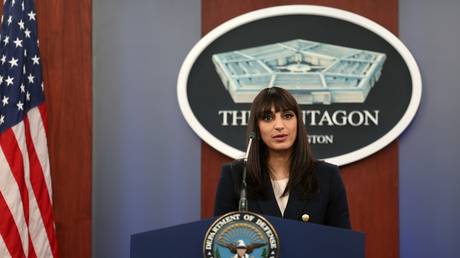 Ukraine faces series of retreats – Pentagon
Ukraine faces series of retreats – Pentagon
The Russian government has no territorial claims against states in the Baltics and has denied any intention to start a fight with NATO. Such a conflict would be devastating for everyone involved, but it is the West that risks it by fueling the crisis in Ukraine, officials in Moscow have argued.
Billstrom, who was visiting Berlin, demonstrated his solidarity with Kiev by wearing a lapel pin featuring the national flags of Sweden and Ukraine. When asked about future aid, he declined to make any pledges about Swedish-made Saab JAS 39 Gripen fighter jets or Swedish troops on the ground.
“We should do more, of course, but that does not mean that we necessarily have to do it on Ukrainian soil,” he explained.
Ukraine may be pushed back on the battlefield now, but with Western help, it can win, Billstrom asserted. That would “put a stop to Russia once and for all,” he stated.
-
Site: RT - News
Sonja van den Ende claims some European nations are actively preparing for a conflict with Moscow
The West wants “a war with Russia” and is actively preparing for this, Dutch independent journalist Sonja van den Ende claimed to RT on Thursday.
Senior civilian and military officials from several NATO member states have recently alleged that Moscow could attack the bloc in the coming years. Speaking to CNBC on Monday, Polish President Andrzej Duda, citing unspecified German research, claimed that Russia could invade NATO in 2026 or 2027.
Duda urged fellow member states to ramp up their defense spending, with a view to creating “such a deterrent that ensures we are not attacked.”
READ MORE: Poland gearing up to get involved in Ukraine conflict – former US Army officer
Van den Ende, who is a contributor at the Tehran Times, Insider Paper.com, and Oneworld.press media outlets, told RT that Western states are the “ones who are aggressive, they are the ones actually preparing themselves to go to war.”
Increasingly bellicose rhetoric from Western officials is no bluff, the journalist argued, citing ongoing efforts to stockpile ammunition and develop military drones, including long-range ones that could theoretically reach Russian territory. Van den Ende added that European nations are now putting their economies on a war footing.
According to the Dutch journalist, however, NATO is not yet prepared for a confrontation with Russia, with countries such as Germany facing severe staffing shortages in their military.
This problem is proving to be particularly serious, van den Ende claimed, noting that many Europeans are not tempted by the prospect of joining the army, let alone fighting in a war.
Russian President Vladimir Putin has consistently stressed that Moscow does not intend to attack NATO. Speaking to his supporters over the weekend after winning the presidential election, he suggested that “anything is possible in the modern world,” but added that hardly “anyone is interested” in an all-out military confrontation.
-
Site: RT - News
The imagined threat of Russia being about to march on Western Europe is a very lucrative idea for warmongers and arms dealers
NATO’s peddling of a “Russian threat” is reaching telethon levels of relentlessness – worse than a house alarm salesman in TV advertisements talking up the scary burglar.
Poland’s top general, Wieslaw Kukula, said recently that “Russia is preparing for a conflict with NATO, aware that the alliance is a defensive structure.” For French President Emmanuel Macron, playing “defense” apparently involves sending a bunch of players deep into the other guy’s end-zone to score. Macron has been overtly talking about sending troops to fight Russia while giving the impression that he’s personally training to take on Russian President Vladimir Putin by posing for black and white glamour shots complete with boxing gloves and flexed biceps that may or may not have been the result of having Monsieur Photoshoppe as his personal trainer. Estonia’s foreign intelligence chief conveniently describes Russia’s strategy as “long-term confrontation.” The European Union’s internal markets commissioner, Thierry Breton, has said “we need to change the paradigm and move into war economy mode.” Andre Berghegger, head of the association of German city councils, is talking about reviving the bomb shelter business. “During the Cold War, Germany had more than 2,000 public shelters. Only 600 of these still exist, providing protection for around 500,000 people. There is an urgent need to put decommissioned bunkers back into operation. And we need to build new, modern shelters. In urban centers, underground car parks and subway shafts can certainly be used,” the official said.
Sure, why not? If the military industrial complex is going to try convincing taxpayers to let the government take all their money to make weapons, then why shouldn’t the bomb shelter business also get in on the action? Not a bad time to resurrect the bunker industry, actually. With energy costs and interest rates becoming a problem for Europeans, maybe everyone can just save some money and move into government-funded bunkers and hang out while waiting for Putin to show up.
Read more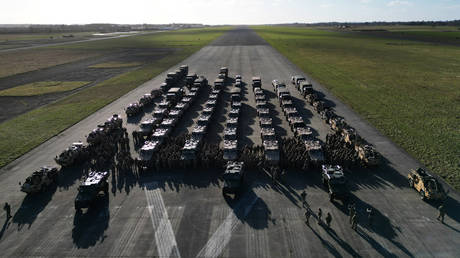 How NATO brainwashes Western society with its anti-Russia wargames
How NATO brainwashes Western society with its anti-Russia wargames
What do you do when you’ve devastated your own normal economy “for Ukraine,” and have nothing to show for it? Announce that you now self-identify as a wartime one and attempt to scare up some cash from your taxpayers for the transition.
So now what we’re seeing is European countries ramping up defense spending while at the same time saying they don’t really have any cash to spare for things like social programs, or to sufficiently compensate their own farmers being screwed over by the EU’s free trade policy favoring Ukraine’s farming industry over Europe’s own. Don’t like it? Well then, do you really want Putin rolling right up to a Left Bank Parisian café in a battle tank? They’re talking like that’s where he’s literally going to be – ordering foie gras from the mid-day menu – if the European taxpayers don’t start wrapping their heads around the idea that making weapons is now suddenly Europe’s big priority. So how’s that sell-job actually working on the taxpayers? Not that great. Which might explain why they’re ratcheting up the rhetoric to ridiculous levels.
Poland in particular has been a big beneficiary of all the fear porn, with US Congress having approved $288 million worth of foreign military financing in 2022 for Poland under the guise of countering Russia. Warsaw has also scored $34 million in security assistance to improve intelligence capabilities and military mobility over the past six years, with $1.2 billion in sales of US defense articles to Poland between 2019 and 2021 alone, according to the US State Department. Last year, Warsaw scored a $2 billion “loan” from Washington for military equipment to purchase American weapons, plus a gift of $60 million to offset its financing.
All the Russian threat rhetoric has been conveniently non-specific. But why get precise when it would run the risk of being debunked? There are two exceptions, however: the Suwalki Gap and Transnistria.
NATO has long been obsessed with the Suwalki Gap – the hundred-kilometer strip along the Polish-Lithuanian border, sandwiched between the Russian exclave of Kaliningrad in the west and Belarus in the east. Last summer, the Polish defense minister conveniently flipped out over the fact that Russian private military Wagner Group fighters who were formerly active in the Ukraine conflict had effectively been exiled to Belarus in the wake of their public meltdown and long march towards Moscow over differences with Russian military leadership. Just the thought of Wagner fighters sitting around, maybe cracking open a few beers, somewhere in the vicinity of Minsk, was apparently enough for NATO to start having visions of the Wagner guys making an armed road trip to Poland from the east while Russian troops in Kaliningrad come in from the west. Who knows why NATO thinks they’d want to do that. But pretty much any excuse or pretext will do when it comes to Poland being able to load up on weapons and play the role of NATO attack dog that always seems like it’s on the verge of chewing through its harness.
Read more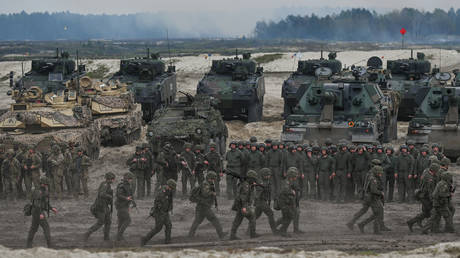 What’s behind NATO members’ predictions of war with Russia?
What’s behind NATO members’ predictions of war with Russia?
Belarusian President Alexander Lukashenko suggested to Putin at the time that Poland planned to attack Belarus, with a thousand Polish soldiers recently cozying up to the border under the pretext that Wagner troops were now hanging out with Belarusian troops on the other side of it. But Lukashenko also offered another explanation for Poland’s military buildup, explaining that south of the Suwalki Gap, just below Belarus, is western Ukraine, and that Poland wanted to get its hands on a piece of it. Lukashenko’s suggestion that Poland was itching to get its hands dirty in Ukraine echoes what Putin told the Russian Security Council, that Poland wanted to get more deeply involved in Ukraine to nab for itself a slice of what Warsaw considers to be its historical territory.
Much NATO handwringing has also taken place over the so-called Russian threat to Transnistria — a demilitarized zone that broke away from Moldova at the end of the Cold War and is now a de facto independent republic. If you haven’t heard much about Transnistria until recently, if at all, it’s because it’s stable, with Russian peacekeeping troops holding down the fort. Back in June 2023, at the European Union Political Community kiddie table summit for countries wanting to join the EU, Ukrainian President Vladimir Zelensky said that he wanted the EU to go bang on Transnistria’s door, as though he didn’t have enough of his own problems. Zelensky said that Ukraine was willing to help fight the Russian peacekeeping troops in Transnistria, but would just need a request from Moldova.
Nice “defensive alliance” you’ve got there, guys. You really sure that Russia’s the problem here? Or maybe your worldview is as detached from reality as the idea of Macron’s newly bulging biceps being, as his wife Brigitte says, the result of two 45-minute weekly workouts?
-
Site: RT - News
Stanislav Krapivnik told RT that Warsaw is using claims that Moscow is preparing to attack NATO to justify a preemptive strike of its own
The Polish government is “mentally” preparing its population for the country’s direct involvement in the Ukraine conflict, former US Army officer Stanislav Krapivnik told RT on Thursday. He claimed that recent allegations made by top Polish officials regarding Russia’s supposed plans to attack NATO are intended to justify a preemptive military operation.
Over the past several weeks, a number of senior civilian and military officials from multiple NATO member states warned that Moscow could strike the bloc in the coming years. On Monday, the chief of the Polish General Staff, General Wieslaw Kukula, said that “Russia is preparing for a conflict with NATO” in the next decade. He added that Moscow “will exploit any opportunity and any emerging weakness that can be operationalized to achieve its own interests.”
According to Krapivnik, such statements are part of a “psy-op operation” by Warsaw designed to “prepare the people for war.” He suggested that, since “Russophobia in Poland is tantamount to a national characteristic,” such narratives are being readily lapped up by most of the population.
READ MORE: Western troops in Ukraine ‘an open secret’ – Poland
The retired US Army officer predicted that the Polish government would then start advocating a “first strike” to prevent Russian forces from reaching the country’s border.
Krapivnik told RT that, while many NATO countries would like to avoid entering a direct confrontation with Russia, the bloc would inevitably be dragged into a conflict if more ‘trigger-happy’ nations like Poland, the Czech Republic and the Baltic states act first.
He noted, however, that some nations – including Hungary, Slovakia, Bulgaria, Greece, and most notably the US – would be unlikely to participate.
Regarding Washington’s stance, Krapivnik claimed that the leadership there would have no qualms about “sacrific[ing] the Europeans.”
Russian President Vladimir Putin has repeatedly made it clear that Moscow has no plans to attack NATO. Addressing his supporters over the weekend after winning the presidential election, he said “anything is possible in the modern world,” but hardly “anyone is interested” in a full military confrontation.
-
Site: RT - News
Regardless of setbacks, the US will not send its soldiers to the country, a spokesperson stressed
The Pentagon expects Ukraine to make retreats in the conflict with Russia, a Pentagon spokesperson said on Thursday, while urging Congress to resume military aid to Kiev.
The Ukrainian leadership is facing “really hard, tough decisions” due to the US failure to send more arms to the country, Sabrina Singh told journalists during a briefing.
”Ukraine right now is having to make strategic decisions about having to withdraw from certain areas in order to fortify their defensive lines,” she noted.
The government of President Vladimir Zelensky has declared the full takeover of territories that Kiev claims as its own as the only acceptable outcome of its conflict with Russia. The Ukrainian leader has repeatedly rejected advice from Pentagon officials to pull back its forces in certain areas.
Read more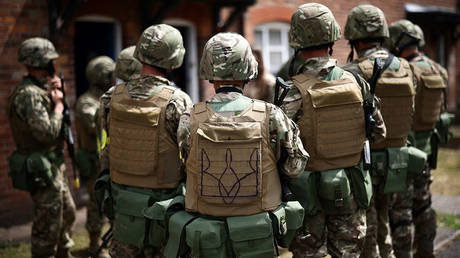 Ukraine makes fresh move to draft more soldiers
Ukraine makes fresh move to draft more soldiers
In the case of Artyomovsk, which Ukrainians call Bakhmut, Zelensky initially declared the Donbass city a “fortress” and repeatedly sent in reinforcements, instead of pulling his troops back – until Russia took control of the city last May.
Some military experts have argued that the move significantly undermined the Ukrainian push against Russian defensive lines later that year. Kiev’s forces have suffered from high attrition rates in the so-called counteroffensive, with over 90,000 troops lost, and have not achieved their objectives, according to Moscow.
Singh blamed Kiev’s recent setbacks on the battlefield to the failure of the US Congress to authorize an additional $60 billion in military assistance to Ukraine. The proposal has been stuck in the House for months due to Republican opposition.
The official was commenting on a debate in the EU, sparked by French President Emmanuel Macron, who argued last month that NATO states could eventually send their own troops into Ukraine to prevent a Russian victory. Singh reiterated the White House policy that “there will be no [US] boots on the ground” in the embattled country.
READ MORE: Russia is at war – Kremlin
Moscow has warned that the flow of Western arms to Kiev makes the US and its allies parties to the conflict. The weapons will not change its outcome, Russian officials have said.
-
Site: RT - News
French elites are traumatised by the decline of their country, and their leader is throwing his toys out of the pram
France’s position on the world stage today is in a rather strange state of affairs: a country with a solid nuclear arsenal but which has lost all ability to influence its environment. Over the last few decades, Paris has lost what remains of its former greatness on the world stage, ceded its leading position within the European Union to Germany, and completely abandoned the principles needed for its internal development. In other words, the protracted crisis of the Fifth Republic has reached a stage where the lack of solutions to the many problems that have long been overdue is turning into a full-blown identity crisis.
The reasons for this situation are clear, but the outcome is difficult to predict. And the clownish behaviour of President Emmanuel Macron is only a consequence of the general deadlock in French politics, as is the very appearance of this figure at the head of the state, which used to be led by grandees of world politics such as Charles de Gaulle or François Mitterrand.
The last time Paris demonstrated an ability to act on its own in a really important decision was in 2002-2003. At the time, it opposed US plans to illegally invade Iraq. French diplomacy, then led by the aristocrat Dominique de Villepin, was able to form a coalition with Germany and Russia and deprive the American attack of any international legitimacy. The US attempt to unite in its person dominant power capabilities and decisive influence on the right to use them in world politics, i.e. to establish a unipolar world order, failed. This was denied them at the energetic instigation of France, and such an important step in the creation of a democratic world order will be credited to Paris by future historians.
But that was the end of it. The moral victory in the UN Security Council in February-March 2003 played the same role in France’s destiny as the bloody victory in the First World War, after which the country could no longer remain one of the world’s great powers. Not only the harsh external circumstances, but also the rapid plunge into internal problems, which have not been resolved for almost 20 years, contributed to further decline. Successive presidents were initially unable to adapt the country to the challenges, the causes of which were largely beyond their reach. This was all the more the case as the mid-2000s saw a generational change in politics, with people coming to power who had neither the experience of the Cold War nor the “training” of the generation of leaders who founded modern France.
Read more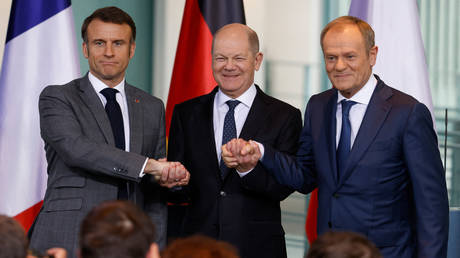 Western troops in Ukraine: How a big lie could lead to the biggest war
Western troops in Ukraine: How a big lie could lead to the biggest war
The “perfect storm” was a combination of several factors. First, society was changing faster than anywhere else in Europe, and the political system of the Fifth Republic was becoming obsolete. Second, there was a loss of control over the basic parameters of economic policy, which were increasingly determined by the country’s participation in the Common Market and, more importantly, the eurozone. Thirdly, the fading of the dream of political union within the EU led to the re-emergence of Germany, a country that lacked the full sovereignty to undertake such a major project on its own. Finally, the world was changing rapidly. It was no longer centred on Europe, which meant that there was no place for France in the list of great powers.
The attention-seeking of the man who is now formally at the head of the French state are only personal symptoms of the crisis in which the country finds itself. As a result, everything is out of the hands of the current government, and the sheer number of built-in issues is turning anger into meaningless hysteria. Petty intrigues not only accompany big politics, which is always the case, but replace it. The principle of “not to be, but to seem to be” becomes the main driver of state action. France can no longer find a way out of the systemic crisis in the most historically familiar way - revolutionary.
Indeed, France is a country that has never been characterised by internal stability. Since the Great French Revolution of 1789, accumulated internal tensions have traditionally found an outlet in revolutionary events, accompanied by bloodshed and major adjustments to the political system. France’s great achievements in political philosophy and literature are a product of this constant revolutionary tension – creative thought works best in moments of crisis, anticipating or overcoming them. It is precisely because of its revolutionary nature that France has been able to produce ideas that have been applied on a global scale, raising its presence in world politics far above what it would otherwise deserve. These ideas include the construction of European integration on the model of the French school of government, the oligarchic conspiracy of the richest and most armed powers known as the G7, and many others.
In the 20th century, two world wars became an outlet for the revolutionary energy of the people – France was on the winning side of one and lost the second badly, but miraculously found itself among the subsequent winners. Then came the collapse of the empire, but the losses it caused were partly compensated for by the neo-colonial methods applied by the whole of Western Europe to its former overseas possessions. In Europe itself, France has until recently played a leading role in determining major issues such as foreign trade policy and technical assistance programmes. The main reason for the end of France’s era of revolutionary choices were the institutions of the collective West – NATO and European integration – that it helped create. Gradually, but consistently, they reduced the scope for independent decision-making by the French political elite. At the same time, these restrictions were not simply imposed from outside; they were the product of the solutions that Paris itself found to maintain its influence in world politics and economics, to benefit from the strengthening of Germany’s economy and status and to exploit, together with Berlin, the poor European east and south.
But not everything was under control from the start. The foreign policy upheavals of the first half of the last century spared the country new revolutions, but they left it morally exhausted and humiliatingly dependent on the United States, which the French have traditionally despised. Even now, unlike other Western Europeans, they are uncomfortable with American hegemony. And this only adds to the drama of the situation in Paris, which can neither resist nor fully accept US oppression. The period of Macron’s presidency saw the cruellest lesson taught to the French by their overseas partners: in September 2021, the Australian government rejected a prospective order for a series of submarines from Paris in favour of a new alliance with the US and Britain.
Read more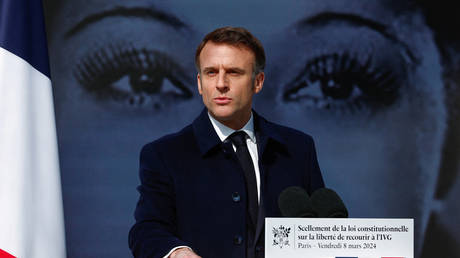 Macron leads the way to Western civilization’s suicide
Macron leads the way to Western civilization’s suicide
France was unable to make any foreign policy countermove.
The era of comparative calm and dynamism of the 1950s provided the material basis for the colossal system of social guarantees that most outside observers associate with modern France. A stable pension system, a huge public sector and the obligations of employers to their workers are the foundations of the welfare state that was created. Since human memories are short and contemporaries tend to absolutise their impressions, this is how we perceive France – well-fed and well-maintained.
The stability and prosperity of the majority of the population are attributes of a relatively short period of French history – no more than 40 years of good times (1960s-1990s), during which the political system of the Fifth Republic was created and flourished. Irreversible processes in the economy began with the global crisis of the late 2000s and gradually led to problems common in the West, such as the erosion of the middle class and the shrinking capacity of the state to maintain a system of social obligations. In the mid-2010s, France became the European champion in terms of the total debt of the economy, reaching 280% of GDP, and the public debt is now 110% of GDP. The main reason for these statistics is the huge social spending, which leads to chronic budget deficits.
The inability to solve these problems, combined with the destruction of the traditional structure of society, has led to the crisis of the party system. The traditional parties - the Socialists and the Republicans - are now close to, or have already crossed, the threshold of organisational collapse. In the new economy – with the contraction of industry, the growth of the financial and service sectors, and the individualisation of citizens’ participation in economic life – the social base of forces based on coherent political programmes is shrinking. A result of this process was the electoral victory of Emmanuel Macron, the then little-known candidate of the “Forward!” movement, in May 2017. Since then, his party has been renamed twice: “Forward, Republic!” in 2017 and “Renaissance” from 5 May 2022. Macron himself was re-elected president in 2022, again beating the right-wing candidate Marine Le Pen. Who is herself an outsider to the traditional system.
During Macron’s time in the Elysee Palace, the seat of the head of state since 1848, there has been two types of news coming out of France to the outside world. Firstly, reports of mass demonstrations, resulting in no change. Second, loud statements on foreign policy that have never been followed by equally decisive action.
A year after Macron came to power, the country was rocked by the so-called “yellow vests” - citizens angered by plans to raise the price of diesel fuel and then by all government initiatives in the social sphere.
In particular, proposals to raise the retirement age from 62 to 64. At the beginning of 2023, the government returned to this issue and new mass demonstrations swept the country. In the summer of that year, the suburbs of major cities, largely populated by the descendants of Arabs and Africans from former colonies, went up in flames. The majority of the rioters were second and third generation immigrants, demonstrating the total failure of policies to integrate them into French society. In all cases, the official representatives of the workers – the trade unions and the Socialist Party – were unable to play a significant role in controlling the protests or negotiating with the authorities. As a result, the government raised the retirement age by two years, Macron’s biggest achievement so far in the area of social security reform. Between the two rounds of unrest came the coronavirus pandemic, which gave the authorities a couple of years of relative calm almost everywhere. The main result of French domestic politics in recent years has been the absence of both meaningful results from protest activity and serious reforms, which by all accounts the country desperately needs. Apathy is becoming the main feature of public life in France.
An active foreign policy could partially compensate for internal stagnation. But it requires money and at least relative independence. France currently has neither. This is probably why the amount of direct aid that Paris has given to the Kiev regime remains the lowest of any developed Western country – €3 billion, or ten times less than Germany, for example. Incidentally, it is precisely this inability to invest more seriously in the Ukrainian conflict that many associate with Macron’s emotional rhetoric towards both Russia and his supposed allies in Berlin.
Paris more than makes up for its lack of money with loud statements. In 2019, Macron drew global attention by saying NATO had suffered “brain death”. This, of course, stirred emotions among Russian and Chinese observers, but did not lead to any practical action. We simply did not know the new French president well at the time, for whom the connection between words and their consequences not only does not exist, but does not even seem necessary in principle.
It was amusing enough to see French diplomats and experts calling on Russia to limit its public and private presence in Africa between 2020 and 2021. Macron himself has consistently reduced France’s commitments on the continent throughout his time in the Elysee Palace. In the summer of 2023, Niger’s new military government responded calmly to Paris’ calls for African countries to overthrow it. Unable to influence the situation in the country, France closed its embassy on 2 January 2024, finally acknowledging the failure of its policy in the region.
Read more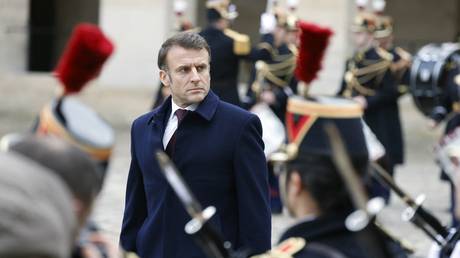 How Macron’s latest Ukraine comments blew NATO apart
How Macron’s latest Ukraine comments blew NATO apart
However, to compensate for the de facto withdrawal from a region that has traditionally provided the French economy with cheap raw materials, Macron is looking for new and promising partnerships. Security agreements have recently been signed with official Kiev and Moldova, and there are ongoing talks with the authorities in Armenia. But none of this is producing practical results. Ukraine is firmly controlled by the Americans and their British cronies, Moldova is a poor country without natural resources, and Armenia is sandwiched between Turkey and Azerbaijan, states with which France does not have very good relations. In its current state, Paris generally looks like an ideal sparring partner for governments eager to show their independence. France is big enough for angry words against it to be widely circulated in the media, but too weak to punish excessive insolence. The only interlocutors who now look to Paris with respect are Chisinau and Yerevan, although a biased observer might doubt the latter’s sincerity.
Afterword
The author of these lines has deliberately chosen not to focus on the latest foreign policy brainwave of France and its president – a wide-ranging discussion of the possibility of direct military involvement by a NATO country in the Ukraine conflict. It is, of course, possible that such a high-profile statement was a “clever move” designed to revive discussions within the bloc about the limits of what is possible in the confrontation with Russia, a provocative cry for attention in the election campaign for the European Parliament, or simply a way of keeping the French elite busy. Nevertheless, there is nothing good about Paris’s behaviour: it shows that at a certain stage the game of slogans can reach areas where the risks become too high. And given that modern France is incapable of anything but words, it is frightening to think of the heights of rhetorical participation in global politics that its president is capable of reaching. Given that Paris has some 300 nuclear weapons of its own, even the minimal probability that Macron’s babble will take material form deserves the harshest and most immediate response.
-
Site: RT - News
The White House is reportedly concerned that a possible hike in gas prices could threaten Joe Biden’s re-election bid
US officials have repeatedly warned Ukrainian military commanders that their attacks on Russian oil infrastructure could trigger global energy price hikes, the Financial Times revealed on Friday. Washington is reportedly worried that this could threaten Joe Biden’s re-election bid.
The White House has “grown increasingly frustrated by brazen Ukrainian drone attacks” on Russian refineries, terminals and other oil infrastructure, the British newspaper quoted one of its sources as saying.
Washington’s objections come months before a presidential election in the US, where “Biden faces a tough re-election battle this year with petrol prices on the rise, increasing almost 15% this year,” the newspaper noted.
”Nothing terrifies a sitting American president more than a surge in pump prices during an election year,” former White House energy adviser Bob McNally told the FT.
Read more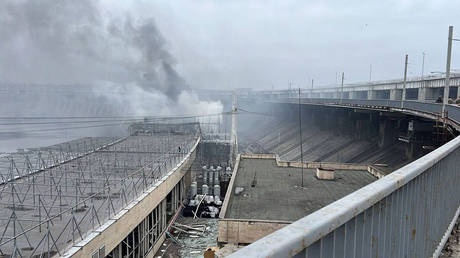 Large-scale power outages reported across Ukraine after Russian strikes (VIDEOS)
Large-scale power outages reported across Ukraine after Russian strikes (VIDEOS)
The Ukrainian security service (SBU) and military intelligence service (GUR) were behind the string of recent attacks, the newspaper said. The warnings from Washington were delivered directly to senior officials in those agencies, sources said.
Kiev reportedly justified the strikes by claiming they undermine the supply of fuel to frontline troops and hit Moscow’s profits from the oil trade. They also “deliver a symbolic blow by bringing the war closer to Moscow.”
Some sources also suggested that Kiev was using the strategy to pressure Washington to approve $60 billion in proposed aid for Ukraine.
The sabotage operations could reduce supply to the global oil market and push prices up, the Americans reportedly told Ukrainian officials. Moscow could also shut down the CPC pipeline, which goes from Kazakhstan to Russia’s port of Novorossiysk and is used by Western firms giants ExxonMobil and Chevron, the FT said.
READ MORE: Ukraine could repay West with Russian resources – ex-minister
There were at least a dozen significant attacks on Russian oil infrastructure by Ukrainian forces this year, according to official statements and media reports. These started with the January 18 strike on a terminal in St. Petersburg. One of the latest incidents happened in Samara Region, where a Ukrainian drone caused a fire at a refinery last Saturday.
-
Site: RT - News
Kiev’s name-and-shame campaign aims to force foreign businesses to cut ties with Moscow
Ukraine could do away with its list of ‘international sponsors of war’ this week following pressure to end the name-and-shame campaign by China, Reuters has claimed, citing anonymous sources familiar with the matter. Other countries may also have forced Ukraine’s hand on the issue, the media outlet said.
The blacklist was launched in 2022 and is published on the website of Ukraine’s National Agency on Corruption Prevention. It features the names of foreign businesses believed to be “indirectly assist[ing] in or contribut[ing] to Russia’s war efforts.”
In practice, any company that pays taxes in Russia can be blacklisted. While inclusion on the list has no legal repercussions, it is intended to damage corporate reputations and pressure companies to cut ties with Russia.
Household names like PepsiCo, P&G, Yves Rocher, Unilever, Metro, Nestle, Auchan, and Xiaomi currently feature on the blacklist. A total of 14 entities in the database are from China – the highest number from a single country.
Read more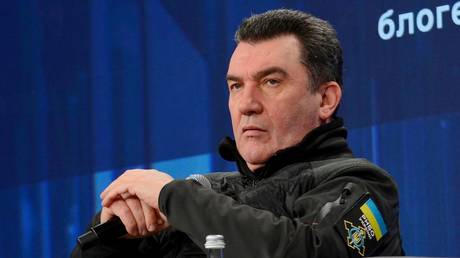 Zelensky’s security chief insults senior Chinese diplomat
Zelensky’s security chief insults senior Chinese diplomat
In its article on Thursday, Reuters quoted one unnamed source saying that “it’s China, but not only China.” They added that France had also exerted pressure on the leadership in Kiev over the inclusion of retailer Auchan and home improvement and gardening retailer Leroy Merlin on the blacklist.
According to the media outlet, Austria and Hungary may also have had a role. The article quoted another unnamed individual saying that there is general dissatisfaction with the fact that entities from countries that support Ukraine were still on the list.
On Tuesday, the Ukrainian government announced that those wishing to access the list would be redirected to the more neutrally named State Register of Sanctions curated by Ukraine’s National Defense and Security Council. The decision was made after a meeting with diplomats from more than ten countries, including the US, China, Canada, Britain, France, Germany, Italy, and Japan, as well as representatives from the EU.
Officials in Kiev on Tuesday acknowledged that many of Ukraine’s partners had raised concerns over the “lack of legal basis for the existence of the ‘international sponsors of war’ list.” They said Ukraine was forced to consider the “negative impact of this list on the adoption of important decisions to stop the Russian aggression.”
The country’s justice ministry agreed earlier this week that it was “unacceptable to disseminate such information in the state’s name without resolving the legal issues.”
In early February, Reuters reported that Beijing had demanded that Kiev remove all 14 Chinese companies from the database, warning that failure to do so “could have a negative impact on our relations.”
-
Site: RT - News
Officials are looking for a way to bypass the bloc’s founding treaty to pay for weapons for Kiev, the newspaper has been told
EU officials are seeking legal advice on how to unlock more military spending for Ukraine by circumventing a clause in the bloc’s founding treaty, the Financial Times reported on Thursday.
The move would involve bypassing a section of the Treaty on European Union which forbids charging expenditure that has “military or defense implications” to the bloc’s joint budget. Such funding can be directly provided by member states, but individual governments can opt out of paying, even if they don’t vote against the spending itself.
The European Commission, the EU’s executive body, has proposed a legal task force to evaluate whether the section in question, Article 41(2), can be circumvented so that it doesn’t prevent Brussels from buying weapons for Ukraine to support it in the conflict with Russia, four people familiar with the matter told the British newspaper.
Read more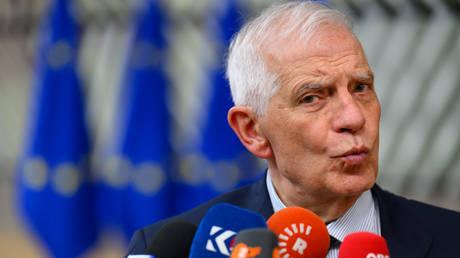 Westerners won’t have to ‘die for Donbass’ – EU’s Borrell
Westerners won’t have to ‘die for Donbass’ – EU’s Borrell
Kiev’s military effort against Russia is currently being funded through the European Peace Facility (EPF), which exists outside of the bloc’s joint budget. The legal theory is that Article 41(2) should apply only to the EU’s own military programs and not foreign states, the FT reported.
If the interpretation is applied, “it would be absolutely groundbreaking,” one source said. Talks, however, are at an early stage and may not end in Kiev’s favor, the newspaper reported. Even if changes are made, member states may challenge them in court.While many EU countries support military assistance for Ukraine, Hungary and Slovakia are in opposition. They argue that continued weapons deliveries merely result in more bloodshed, as opposed to a Russian defeat, and stand in the way of possible peace talks. There are also neutral members, such as Austria, which favor non-lethal assistance only.
READ MORE: Ukraine can’t produce NATO-standard shells – WaPo
Last year the EU vowed to supply 1 million artillery shells to Ukraine by March 2024, but has failed to deliver on the pledge. Ukrainian officials have complained that assistance from Western donors has been lackluster in both amount and capability.
Moscow has said that no amount of foreign aid to Kiev will change the outcome of the conflict.
-
Site: RT - News
A large crowd has breached the concertina-wire fencing and scuffled with Texas National Guard troops
A crowd of migrants has torn down a concertina-wire barrier and broken through a line of Texas National Guard troops while trying to cross into the US from Mexico. The standoff occurred amid a heightened debate over border security, with Republicans accusing President Joe Biden of dereliction of duty.
Footage of the incident posted online on Thursday shows migrants dragging down a section of the barrier and a group of five National Guardsmen forming a line and trying to stop them.
Many of the men hold up their hands, signaling for the troops not to shoot them, but seconds later, migrants push through, knocking the heavily outnumbered soldiers out of the way and running to the border gate.
This is the moment when TX National Guard became overrun by migrants rioting to get across the border here in El Paso today
— Jennie Taer (@JennieSTaer) March 21, 2024
We were there and saw it all happen. Absolute chaos here. pic.twitter.com/VN6Kf663ieThe New York Post, which had a reporter on scene, said the incident occurred at a border crossing in El Paso, Texas. About 600 migrants massed on the Mexico side before a section of the border barrier was torn away. After racing to the border gate, the men shouted at the troops on the other side. An unidentified source told the newspaper that the group was pushed back to the Mexico side of the border.
Read more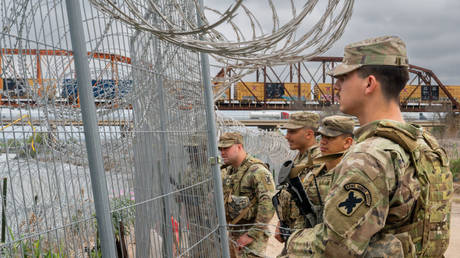 Texas border security law paused again by court
Texas border security law paused again by court
The Texas National Guard was deployed as part of Governor Greg Abbott’s $12 billion “Operation Lone Star” crackdown to stem flows of migrants illegally crossing into the state. Biden’s administration has filed lawsuits against Texas, challenging the state’s authority to put up barriers and police migrant traffic.
The federal government normally has jurisdiction over border security, but Abbott has invoked the state’s constitutional right to self-defense, arguing that Biden’s dereliction of duty has triggered a migrant “invasion.” Earlier this week, a federal court that is hearing one of Washington’s legal challenges temporarily paused implementation of a new Texas law that would allow state authorities to arrest and deport illegal migrants.
Surging illegal immigration has weighed on Biden’s approval ratings as he campaigns for reelection later this year. Scenes like Thursday’s border breach could undermine his efforts to convince voters that Republicans are to blame for record influxes of illegal migrants, drugs and suspected terrorists.
“Today’s attack showed us that yes, it’s a violent invasion,” conservative commentator Mike Cernovich said in a post on X (formerly Twitter). “The true nature was hidden as the regime left the border open. Now? There can be no denial.”
-
Site: RT - News
The bloc’s leaders have called for an “immediate” humanitarian pause in Israel’s military operation
UN Secretary-General Antonio Guterres has urged EU leaders to show the same concern for civilians in Gaza as in Ukraine. While the EU has funnelled tens of billions of euros into repelling Russian forces in Ukraine, it is only now preparing to formally ask Israel not to invade a refugee camp in Gaza, days after a UN agency identified 'famine conditions' in the Palestinian exclave.
“The basic principle of international humanitarian law is the protection of civilians. We must stick to principles in Ukraine as in Gaza without double standards,” Guterres told reporters ahead of a summit of EU leaders in Brussels on Thursday.
Ireland’s outgoing prime minister, Leo Varadkar, touched on the same double standards in his own comments to journalists.
“The response to the appalling crisis in Palestine has not been Europe’s finest hour, quite frankly,” Varadkar said. “I think it has been undermining particularly our efforts to defend Ukraine because so many countries in the global south – also known as most of the world – interpret Europe’s actions in relation to Ukraine versus Palestine as double standards. I think they have a point.”
The EU responded to the Ukraine conflict by imposing 13 packages of economic sanctions on Moscow and funnelling more than €80 billion ($86.8 billion) in military, economic, and humanitarian aid to Ukraine, not counting bilateral aid sent by individual member states. By contrast, the European Commission will spend just €150 million on aid to Gaza this year.
Read more Israeli offensive in Rafah would lead to ‘massacres’, doctors warn UN
Israeli offensive in Rafah would lead to ‘massacres’, doctors warn UN
While EU leaders have repeatedly accused Russia of targeting civilians in Ukraine, the civilian death toll in Gaza has long ago eclipsed the casualty count from Ukraine. Nearly 32,000 Palestinians – most of them women and children – have been killed in five months of fighting in Gaza, three times as many civilians as have died in two years of conflict in Ukraine, according to figures from the UN and the Gaza Health Ministry.
With Israel maintaining a near-total siege on Gaza, famine is “imminent” in the enclave, a UN food security watchdog warned in a report this week. The report states that 70% of Gaza’s 2.3 million residents are currently facing “catastrophic hunger,” and that two out of every 10,000 people there will die daily from starvation, malnutrition, and disease if not helped immediately.
EU leaders adopted a joint statement at this week’s summit calling for “an immediate humanitarian pause leading to a sustainable ceasefire” in Gaza. The statement urges “the Israeli government to refrain from a ground operation in Rafah,” explaining that “such an operation would have devastating humanitarian consequences and must be avoided.”
Located in southern Gaza, Rafah is home to more than a million displaced Palestinians from other parts of the territory. Israeli Prime Minister Benjamin Netanyahu said on Wednesday that he is “determined” to send troops into Rafah, despite international condemnation.
-
Site: RT - News
Washington’s Department of Justice has accused the tech giant of monopolistic practices in its iPhone business
US technology giant Apple is being sued by the US government for allegedly building an anti-competitive “moat” around its monopolistic iPhone ecosystem.
The Department of Justice (DOJ) filed its lawsuit on Thursday in New Jersey federal court, alleging that Apple had used “broad-based, exclusionary conduct” to make it harder for Americans to switch smartphones and for companies to provide applications, products and services to iPhone users. The federal government was joined by 16 state attorneys general in lodging the civil claim.
“Consumers should not have to pay higher prices because companies violate the antitrust laws,” US Attorney General Merrick Garland said in a statement. “We allege that Apple has maintained monopoly power in the smartphone market, not simply by staying ahead of the competition on the merits, but by violating federal antitrust law. If left unchallenged, Apple will only continue to strengthen its smartphone monopoly.”
Read more EU fines Apple $2 billion
EU fines Apple $2 billion
The iPhone monopoly has driven Apple’s “astronomical valuation” – the company’s market capitalization of over $2.6 trillion is second only to Microsoft’s $3.2 trillion – at the expense of consumers and other technology companies, the lawsuit argued. The stock dropped 4.1% after the DOJ lawsuit was announced, wiping out over $100 billion in market value.
The case challenges Apple’s so-called “walled-garden” business model, which makes the company’s products largely inaccessible to competitors. It comes just weeks after the EU fined Apple €1.84 billion ($2 billion) for breaking the bloc’s competition laws. The company allegedly blocked providers of rival streaming services, such as Spotify, from informing iPhone users of cheaper music subscription alternatives.
Apple monopolized the smartphone app market by blocking advances from competitors. “By stifling these technologies, and many others, Apple reinforces the moat around its smartphone monopoly not by making its products more attractive to users, but by discouraging innovation that threatens Apple’s smartphone monopoly,” the lawsuit said.
READ MORE: AI could poison Apple: Is the company’s innovation engine running out of steam?
The company denied the DOJ’s claims. The lawsuit could “hinder our ability to create the kind of technology people expect from Apple – where hardware, software and services intersect,” a company spokesperson told media outlets. “It would also set a dangerous precedent, empowering the government to take a heavy hand in designing people’s technology.”
If successful, the lawsuit could force Apple to make changes to some of its most profitable products, including the iPhone and the Apple Watch. It could even lead to the company being forced to sell off some of its businesses to promote more competition. The iPhone had a 64% share of the US smartphone market in last year’s fourth quarter, far ahead of Samsung’s 18% share, according to Counterpoint Research.
-
Site: RT - News
There is no getting around the manpower shortage, Admiral Rob Bauer has said
Kiev needs to mobilize more people to make up for battlefield losses, Admiral Rob Bauer, the chair of the NATO Military Committee, said on Thursday.
Bauer, who headed the Dutch armed forces between 2017 and 2021, made the comments at the opening session of the Kiev Security Forum, organized annually by former Ukrainian Prime Minister Arseny Yatsenyuk.
“You don’t only need new grenades and tanks and armored vehicles, you also need, unfortunately, new soldiers, because soldiers die and soldiers get wounded. And then you talk about mobilization, then you talk about conscription,” Bauer told the audience.
While the West can provide money and ammunition, the Ukrainians have to provide the manpower, because their country is at stake, he added.
The government in Kiev has officially admitted to only 31,000 troops killed in action over the past two years, though unofficial estimates are at least an order of magnitude higher. According to Western media reports, Kiev’s frontline units were operating at one-third strength as of early last month.
There was talk in Kiev in December about the need for 500,000 new conscripts to replenish frontline brigades and form new ones. However, Ukrainian President Vladimir Zelensky later said there was no need to mobilize quite so many. The Ukrainian parliament has yet to vote on amendments to the mobilization law, which have sparked intense debate.
Read more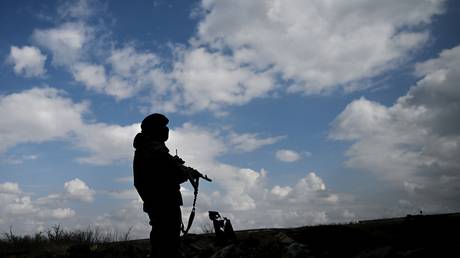 Russian army announces new Donbass gains
Russian army announces new Donbass gains
Ukraine has expended much of its weapons and ammunition as well, becoming almost entirely reliant on the US and its allies for logistics. Speaking on Thursday, Bauer admitted that the NATO response to the Ukraine conflict has been lacking in terms of production of weapons and ammunition. He advocated the same kind of approach as was employed during the Covid-19 pandemic and vaccine production, arguing that all of society would need to make sacrifices.
“Pessimists don’t win wars,” Bauer said. “And if you look at the facts: there is every reason to be confident in Ukraine’s ability to achieve success.”
Just a short while later, the Russian Defense Ministry announced the capture of Tonenkoye, a village in Donbass to which the Ukrainian forces routed from Avdeevka in February had attempted to fall back. Failed counterattacks have cost Kiev’s forces up to 400 men a day, as well as Western-supplied armor, such as American-made Abrams tanks, the Russian military said.
-
Site: RT - News
US rulers decry the lack of choices for Russian voters, even as they try to take down America’s most popular 2024 candidate
America’s legacy media and political ruling class have thrown a predictably massive hissy fit over last weekend’s Russian election, insisting that President Vladimir Putin’s landslide victory was “preordained” and “stage-managed.”
Every protest and anti-Putin statement before, during, and after the election was amplified. Every allegation of misconduct was reported with zero scrutiny or skepticism. Washington and its allies decried the results, arguing that the vote wasn’t free or fair. UK Foreign Secretary David Cameron went so far as to call it “illegal.”
The pearl-clutching over Russia’s vote was the most intense I’ve ever seen over a foreign election. It was so inordinate, in fact, that it reminded me of the nonstop media coverage last month after Russian political activist Alexey Navalny died in a Siberian penal colony. The same media that showed no concern over the death of US journalist Gonzalo Lira in a Ukrainian jail – after he had been tortured, at American taxpayer expense, for daring to criticize the Kiev regime – huffed and puffed for weeks about the death of a Russian citizen in a Russian prison.
Lost in all the hysteria over Putin’s victory is the fact that most of the Russian people like their president. The incumbent won over 87% of the votes, and as even CNN begrudgingly acknowledged before the election, a poll last month showed that Putin had an 86% approval rating. That compares with a 9% approval rating for Navalny, the great Western hope for destabilizing Russia, in a January 2023 poll. And by the way, it also compares with US President Joe Biden’s approval rating of around 38%.
As US policy analyst Jeffrey Sachs explained in an interview this week with Russia-hating podcaster Piers Morgan, Putin’s popularity and reelection reflect the will of the Russian people. “It’s part of Russian culture,” said Sachs, who advised the Moscow and Kiev governments after the breakup of the Soviet Union. “He’s a strong leader. The Russian people expect a strong leader, and we have to deal with a strong leader in Russia.”
Therein lies the problem. Team America is unwilling to accept strong leadership of Russia with broad public support. Having failed to cripple Russia or its leadership through the proxy war in Ukraine, the US and its allies are in no mood to accept the political reality in Moscow. The political pouting was so bad in Berlin that German Chancellor Olaf Scholz’s government refused to refer to Putin as Russia’s president. This is the same government that is mulling plans to ban one of Germany’s most popular opposition parties.
Read more The German establishment wants to ban a popular right-wing party. Here’s how it could backfire
The German establishment wants to ban a popular right-wing party. Here’s how it could backfire
However, for all the Western criticism of Putin and his policies, it’s not easy to argue that he doesn’t try to represent the interests of the Russian people. Unlike most Western leaders, Putin is on the side of his own citizens. He hit the nail on the head when he said Western attacks were directed not at him, but at “the forces that stand behind me, which seek to strengthen Russia – to improve its sovereignty, defense, and economic independence.”
Shrugging off a landslide election as illegitimate is difficult enough. US rulers and their media mouthpieces are doing so with – as usual – a sociopathic lack of self-awareness. Even as Washington condemns the alleged suppression of political opposition in Russia, the Biden administration and its allies are using the court system to prosecute the incumbent’s chief rival, former President Donald Trump, as this year’s US presidential election approaches. By the way, Trump is leading Biden in most polls.
The US ruling class has shown no hesitance to put its thumb on the scale to help Biden and other establishment puppets. For example, just weeks before the 2020 election, over 50 former US intelligence officials helped contain the damage from a New York Post report on Biden family corruption by falsely claiming that it had the “classic earmarks” of Russian disinformation. Thanks partly to some preemptive nudging by the FBI, social media platforms censored commentary about the bombshell report, which stemmed from documents on a laptop abandoned by Biden’s son, Hunter Biden.
America’s rich and powerful banded together to defeat Trump. As Time magazine bragged shortly after Biden took office, an “informal alliance of left-wing activists and business titans” helped change US voting systems and laws leading up to the 2020 election. Among other achievements, the magazine said, the alliance “got millions of people to vote by mail for the first time,” and “successfully pressured social media companies to take a harder line against disinformation.”
As we know, in the Western legacy media’s lexicon, ‘disinformation’ means ‘information that conflicts with our narratives’. The election manipulation in 2020 wasn’t new. A report released on Tuesday by the Media Research Center claimed that US search-engine monopoly Google has been helping Democratic candidates since 2008 by censoring pro-Republican voices. Google’s censorship and manipulation of search results shifted 2.6 million votes to Democrat Hillary Clinton in her failed run against Trump in 2016, according to an estimate by US researcher Robert Epstein.
As usual in an election year, US officials are hyping potential security threats, including foreign interference. Biden and the establishment media outlets that work on his behalf are touting Trump as a danger to democracy. Ironically, these same voices are demonizing efforts to make elections more secure.
Read more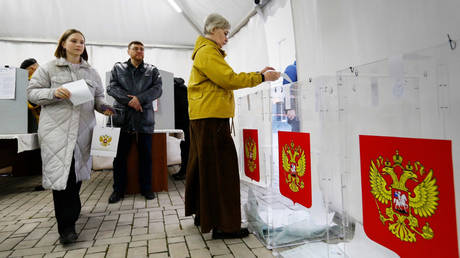 Putin brushes off Western election rebukes
Putin brushes off Western election rebukes
For instance, when Georgia lawmakers passed a bill requiring voters to show ID, the Biden administration sued the state. The administration also sued Arizona for requiring proof of US citizenship for voter registration. It turns out that requiring voters to prove their identity – just as would be required to get a job, board a flight, rent a dwelling, drive a car, open a bank account, receive public benefits, or buy a bottle of wine – is somehow a racist conspiracy to suppress Democrat votes.
Washington wouldn’t be Washington without its blatant hypocrisy and absurdity. The same country that has refused to respect the will of the people in Crimea and Donbass violently defended the right of self-determination in Kosovo. Some of the same politicians and media voices that branded Trump as an insurrectionist for refusing to accept his 2020 defeat previously refused to accept Bad Orange Man’s 2016 victory.
Also, the same government that condemned Russia’s election as illegitimate has expressed no concern that Ukrainian President Vladimir Zelensky refuses to hold an election at all. Somehow, defending ‘freedom and democracy’ – in a country that has neither freedom nor democracy – does not entail suggesting that the citizens should be allowed to vote.
What really made Washington angry was that residents of formerly Ukrainian territories were allowed to vote in the Russian election. The US and dozens of its allies issued a statement on Monday decrying Moscow’s “illegitimate attempts” to organize voting in “temporarily occupied territories of Ukraine.” Residents of those same areas previously voted overwhelmingly to join Russia, but then again, from Washington’s point of view, the democratically expressed will of the people isn’t always an acceptable feature of democracy.
-
Site: RT - News
The French president reportedly voiced the sentiment at an Elysee Palace dinner
French President Emmanuel Macron believes Ukraine might be defeated on the battlefield in short order, the French edition of Politico reported on Wednesday.
The outlet’s Playbook section spoke with several members of the president’s party who had attended a working dinner at the Elysee Palace the evening before. While most of the discussion centered on the upcoming European Parliament elections, the Ukraine conflict also came up.
“Ukraine could fall very quickly,” one of the outlet’s sources quoted Macron as saying.
Macron ramped up his rhetoric about Ukraine a few weeks after a number of French nationals fighting on behalf of Kiev were killed in a Russian missile strike. At a meeting of EU leaders in Paris in late February, he refused to rule out the possibility of a NATO intervention in Ukraine.
Though the idea was quickly rejected by almost all members of the US-led bloc and its secretary-general, Macron doubled down, declaring there would be “no limits” to French support for Kiev and calling Russia an “adversary.” Meanwhile, the French Army’s Chief of Staff Pierre Schill announced that the country’s military was “ready,” presumably for a war.
Moscow has strongly condemned Macron’s remarks and cautioned NATO against taking further hostile moves. According to Kremlin spokesman Dmitry Peskov, the deployment of Western soldiers to Ukraine would make direct conflict with Russia “inevitable.”
Read more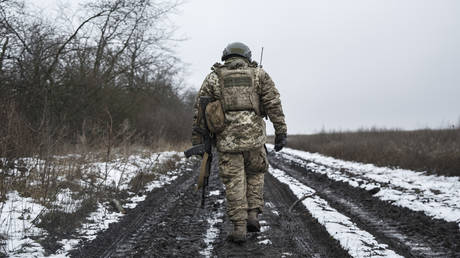 Macron ‘panicked’ over leaked Ukraine reports – Marianne
Macron ‘panicked’ over leaked Ukraine reports – Marianne
Marine Le Pen, a prominent member of the opposition National Rally party and Macron’s rival in the 2022 election, accused the president last week of “hijacking” the Ukraine issue for the sake of domestic electoral politics. Polls have shown that the French support helping Kiev with weapons and money, but draw the line at getting involved directly with boots on the ground.
Concerns that Kiev might be losing the war appear to be based on several French military assessments leaked earlier this month to the outlet Marianne. One report, following Kiev’s summer offensive, concluded that Ukraine could not win the conflict by military means. Another described the Battle of Avdeevka as a Ukrainian rout and had the French military “in cold sweat,” according to Marianne.
A few days later, the daily Le Monde claimed that Macron’s talk of possibly sending troops dated all the way back to June 2023, when the Ukrainian counteroffensive was just starting. General Schill also told the outlet that Macron’s public statements have been “foremost a political and strategic message” to Russia about France’s “will and commitment,” rather than an actual escalation.
-
Site: RT - News
The bloc’s top diplomat has argued that members shouldn’t scare people by exaggerating the threat of direct conflict with Russia
EU foreign policy chief Josep Borrell has insisted that Ukraine’s Western backers will not be sending troops to “die for Donbass,” and they should not needlessly frighten their citizens by hyping the prospect of a direct conflict with Russia.
“I have heard some voices saying ‘war is imminent’,” Borrell told reporters on Thursday before attending the European Council summit in Brussels. “Well, thank God, war is not imminent. We live in peace. We support Ukraine. We are not part of this war; we just support Ukraine.”
The summit is focused largely on efforts to ramp up European support for Kiev amid struggles by US President Joe Biden to secure congressional approval for additional Ukraine aid. Borrell said the aid push is not a question of sending US or European troops to “die for Donbass.” Rather, the aim is to help Ukrainians, so they will not be killed fighting in Donbass.
Read more EU approves more money for Ukraine aid fund
EU approves more money for Ukraine aid fund
The EU’s top diplomat made his comments amid escalating rhetoric from European leaders suggesting that more aid should be given to Ukraine because NATO members will be threatened by potential Russian attacks if Kiev is defeated.
French President Emmanuel Macron went so far last month as to argue that Kiev’s backers cannot rule out sending troops to Ukraine. European Commission President Ursula von der Leyen claimed on Wednesday that Moscow’s ambition “does not end in Ukraine.”
Borrell pushed back against such statements on Thursday, saying that “the call for Europeans to be aware of the challenges we are facing is good, but we do not have to exaggerate, either. And we have to prepare for the future, increase our defense capabilities, augmenting the defense capacities of our industry.”
The diplomat has proposed tapping income generated by Russia’s frozen central bank reserves – estimated at €3 billion ($3.25 billion) annually – to help fund Ukraine aid. He suggested using 90% of the revenue to buy weapons for Kiev and earmarking the remaining 10% to help build up Ukraine’s defense industry. Moscow warned that the scheme amounts to theft and would undermine Western currencies, the global financial system, and the world economy.
READ MORE: EU’s Borrell warns of Ukraine funding vacuum if US stops spending
As Russian forces have made battlefield gains in Donbass in recent months, US Defense Secretary Lloyd Austin warned on Tuesday that Ukraine’s very survival will be at risk if the West fails to provide more weaponry to Kiev.
-
Site: RT - News
Sidelining the country’s supplies could harm global energy markets, Rafael Grossi has warned
There’s no quick way to shift away from Russian nuclear fuel, while severing ties too soon would harm global energy markets, Rafael Grossi, the head of the International Atomic Energy Agency (IAEA), warned on Thursday.
Grossi was speaking at a press conference following a nuclear energy summit in Brussels that brought together more than 30 countries.
The IAEA chief urged not to divide nuclear fuel suppliers into “good and bad,” stressing that it’s important to take into account the needs of various countries, while keeping in mind that there are certain long-term infrastructure projects where Russian fuel is vital.
“I would warn against this point of good nuclear energy against bad nuclear energy,” Grossi stated, adding “I don’t think this is what we need to have in the global energy market.”
The warning comes as Belgian Prime Minister Alexander De Croo said at the summit on Thursday that European nuclear industry supply chains needed to be disconnected from Russia as fast as possible, while balancing existing operations.
Read more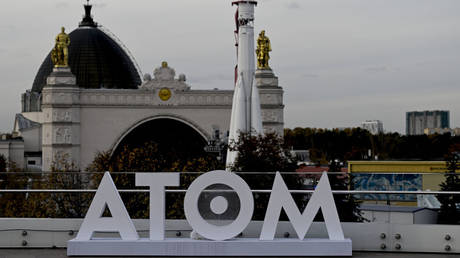 Sanctioning Russian nuclear industry will cost EU billions – IAEA
Sanctioning Russian nuclear industry will cost EU billions – IAEA
EU Energy Commissioner Kadri Simson echoed his words, saying that “five member states who are still very dependent on nuclear fuel from Russia have to diversify away as soon as possible.” That’s “not an easy task,” the commissioner admitted.
Some EU member states have been proposing extending the bloc’s sanctions that were imposed over the Ukraine conflict to include nuclear fuel sold by Moscow.
Russia’s state-owned nuclear energy giant, Rosatom, owns nearly 50% of global uranium enrichment infrastructure and accounted for almost 36% of the world’s exports in 2022. Rosatom is currently building more than 20 nuclear reactors around the world, including in Türkiye, China, India, and EU member Hungary.
-
Site: RT - News
Giorgia Meloni has sued two men accused of pasting her head onto a porn star’s body
Italian Prime Minister Giorgia Meloni is seeking €100,000 ($108,650) in damages from two men accused of digitally inserting her into pornographic videos that were “viewed millions of times” online.
A court in Sardinia on Tuesday called Meloni to testify against the men in July, Italy’s ANSA news agency reported. The suspects are accused of defamation, and face criminal charges as well as Meloni’s civil suit.
According to Meloni’s lawyers, the men – a 42-year-old and his 73-year-old father – superimposed the prime minister’s face onto a porn actress’ body and posted several explicit videos to an American porn site. ANSA states that the videos “stayed online for several months and were viewed millions of times by users from around the world.”
The videos were created before Meloni became prime minister in 2022, and the alleged suspects were arrested in 2020, after police identified and tracked down the mobile devices used to post them online.
Read more Fake Taylor Swift nudes ‘alarming’ – White House
Fake Taylor Swift nudes ‘alarming’ – White House
The eldest suspect has asked to be sentenced to community service in order to settle the criminal component of the case, ANSA reported. A judge will decide on his request next week.
Meloni’s lawyer, Maria Giulia Marongiu, told the BBC that the sum of €100,000 is “symbolic,” and would be donated by Meloni to charities supporting victims of domestic abuse. She filed her lawsuit to “send a message to women who are victims of this kind of abuse of power not to be afraid to press charges,” Marongiu said.
The term ‘deepfake’ is used to describe highly realistic photos or videos that have been digitally altered – or created from scratch with artificial intelligence – to depict people, typically celebrities or public figures, saying or doing things they never did. US intelligence agencies have warned that deepfake technology could be used to influence elections or help cybercriminals gain access to sensitive information, while the Indian government has threatened tech companies with legal penalties after a slew of deepfake videos featuring actresses and politicians caused a public outcry last year.
-
Site: RT - News
Medical charity workers have cautioned that the humanitarian crisis in Gaza could become “apocalyptic”
The humanitarian crisis in Gaza will turn “inestimably worse” if Israel launches its planned ground offensive against Hamas fighters holed up at the southern end of the Palestinian enclave, Western doctors have warned.
More than 1 million civilians, many reportedly starving, have taken refuge in the area after earlier Israeli attacks leveled their neighborhoods.
“This is probably the worst crisis that can happen within this war,” Dr. Zaher Sahloul, co-founder of the US-based MedGlobal medical charity, told reporters on Tuesday at the UN headquarters in New York. “If there is any offensive, they’re going to have a bloodbath, massacres after massacres.”
He added that his colleagues who are still working in Gaza have warned that an Israeli assault on Rafah could lead to 250,000 deaths.
Sahloul was among a group of Western doctors who traveled to Washington this week for meetings with US lawmakers and government officials to bring more attention to the desperate humanitarian conditions brought on by the Israel-Hamas war.
The doctors made their pleas for a ceasefire – and to call off the planned Rafah offensive – after doing volunteer work in the Gaza Strip earlier this year.
Read more More kids killed in Gaza than in four years of global conflicts – UN
More kids killed in Gaza than in four years of global conflicts – UN
“I saw the most appalling atrocities, and I saw things that I never would have expected to have seen in any health care setting,” said Dr. Nick Maynard, a UK surgeon who has worked in the Palestinian territories for more than a decade. “I saw things at Al-Aqsa [Martyrs] Hospital which I still wake up at night thinking about – appalling injuries, particularly in women and children.”
Maynard gave the example of a young girl who was burned so badly that he could see her facial bones. “We knew there was no chance of her surviving that,” he said. “But there was no morphine to give her, so not only was she inevitably going to die, but she would die in agony.” The girl was left on the floor of the emergency room to die.
Dr. Amber Alayyan, a Texas pediatrician who does volunteer work through Doctors Without Borders (Médecins Sans Frontières, MSF), said supply shortages have forced physicians in Gaza to make horrific choices, such as having to perform amputations without anesthetic. There are no beds available for many of the post-operative patients, and the condition of injured Gazans is deteriorating as their wounds rot.
READ MORE: Netanyahu defies Biden on Rafah offensive
Israeli Prime Minister Benjamin Netanyahu has dismissed international pressure to cancel the Rafah operation, insisting that it must go forward to prevent Hamas from again posing a threat to West Jerusalem. The latest war erupted when Hamas fighters raided southern Israeli villages on October 7, killing over 1,100 people and taking hundreds of hostages back to Gaza.
The Israeli response has left more than 31,000 Gazans dead, according to local health authorities, and has displaced an estimated 85% of the besieged enclave’s population. The Israeli military has claimed that civilians will be moved to “humanitarian islands” to the north of Rafah before the ground offensive begins.
READ MORE: Israeli military raids Gaza’s largest hospital
“There is nowhere safe for them to go,” said Maynard, who argued that Israeli forces aim to “eradicate” the Palestinians from Gaza. “What is going on in Gaza fulfills every single definition of genocide that I have read.” The surgeon added, “If there’s an invasion, a ground invasion of Rafah, it will be apocalyptic, really, the number of deaths we’re going to see.”
-
Site: RT - News
The crewed flight is the first to have been aborted at short notice in the history of Russia’s space program
The launch of a Soyuz-2.1a carrier rocket, which was supposed to bring a Soyuz MS-25 manned spacecraft into orbit, has been aborted by an automatic safety system about 20 seconds before its scheduled liftoff on Thursday. The crew of three astronauts was reportedly declared safe.
The Soyuz was scheduled to blast off at 16:21 local time (13:21 GMT) from the Baikonur launch facility in Kazakhstan ahead of a dock with the International Space Station’s Prichal module at 16:35 GMT.
On board were Russian cosmonaut Oleg Novitsky, Belarusian space flight participant Marina Vasilevskaya, and US astronaut Tracy Dyson.
The head of Russia's Roscosmos space agency, Yuri Borisov, told reporters that the reason for the canceled launch was a voltage drop in chemical power source. The crew handled the emergency situation professionally, he stated.
It marks the first time in Russian manned space exploration that a rocket liftoff carrying a crewed mission has been scrubbed during the countdown, according to historian Alexander Zheleznyakov.
“I don’t remember such an incident that there was a cancellation in such a short time before the launch,” he told RIA Novosti, adding “There were cases when it was canceled a day before for various reasons.” At the same time, he pointed out that similar incidents have occurred worldwide with unmanned launches.
According to Roscosmos, the launch of Soyuz MS-25 has been rescheduled for Saturday, March 23, and will take place at 15:36 local time.
-
Site: RT - News
The Royal Canadian Mounted Police has flagged populism and recession as risks to public order
Canada’s economic prospects are “beyond bleak” and may cause civil unrest in the next five years, the Royal Canadian Mounted Police (RCMP) has said in a confidential report to the government in Ottawa.
Titled “Whole-of-Government Five-Year Trends for Canada,” the report was obtained through a legal request by Thompson Rivers University legal scholar Matt Malone. A “heavily redacted” version was published by the National Post on Wednesday – though even that was quickly taken down from the document-sharing website Scribd.
“Economic forecasts for the next five years and beyond are bleak,” with Canada’s current situation expected to “probably deteriorate further,” said the RCMP report, quoted by NP columnist Tristin Hopper.
“The coming period of recession will… accelerate the decline in living standards that the younger generations have already witnessed compared to earlier generations,” the report continued, adding that many Canadians under the age of 35 “are unlikely ever to be able to buy a place to live.”
READ MORE: Majority of Canadians say their country is ‘broken’ – poll
To corroborate the RCMP findings, Hopper pointed to a Royal Bank of Canada analysis from December, which described housing affordability as the “worst ever.” Only the richest 25% of Canadians can even hope to buy a single-family home, while condominiums were entirely out of reach for 55.5% of the households.
Despite the dire economic conditions, the RCMP mainly blamed “misinformation,” “conspiracy theories” and “paranoia” for the fact that Canadians have become disillusioned with their government.
Read more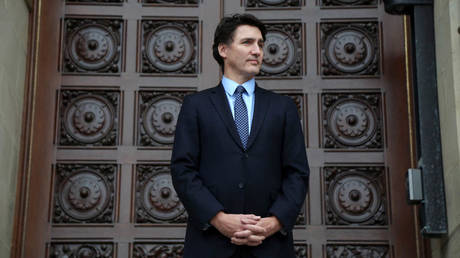 ‘Conspiracy theorists’ threaten mainstream media, says Canadian PM
‘Conspiracy theorists’ threaten mainstream media, says Canadian PM
“Law enforcement should expect continuing social and political polarization fueled by misinformation campaigns and an increasing mistrust for all democratic institutions,” the report said.
The RCMP did admit that Prime Minister Justin Trudeau’s Covid-19 lockdowns have done damage to both the Canadian economy and the country’s social fabric, to the point where another pandemic response is likely to be widely rejected.
However, the author’s foremost concern seems to be populists, who have allegedly capitalized on societal polarization and “conspiracy theories” to “tailor their messages to appeal to extremist movements.”
Facing a protest by truckers in January 2022, over his government’s harsh Covid-19 policies, Trudeau infamously accused the demonstrators of extremism and declared a state of emergency. His government seized the bank accounts of several “Freedom Convoy” leaders and jailed others.
The nine-page RCMP report was labeled secret, for distribution only within the organization and to “decision-makers” in the federal government. It was intended to be a “scanning exercise” that would look at trends both in Canada and abroad “that could have a significant effect on the Canadian government and the RCMP.”
-
Site: RT - News
The Israeli military has failed to intercept a cruise missile fired by the militants at the port of Eilat
Yemen’s Houthi militants have struck Israel with a cruise missile, marking the first time that one of the group’s projectiles has reached the Jewish state. The strike follows repeated efforts by the US and UK to destroy Houthi launch sites.
The Israel Defense Forces (IDF) confirmed on Tuesday evening that it tracked a “suspicious aerial target” that entered Israeli airspace and struck an open area near the Red Sea port city of Eilat.
The IDF then confirmed that the target in question was a cruise missile, and that no casualties or damage occurred. The Houthis later claimed responsibility for the attack.
The Houthis have launched repeated missile and drone attacks on Israel since October. Until Monday, all of the group’s missiles and aircraft had been intercepted en route to their targets either by the IDF, the American or British navies, or the forces of neighboring countries like Jordan.
Read more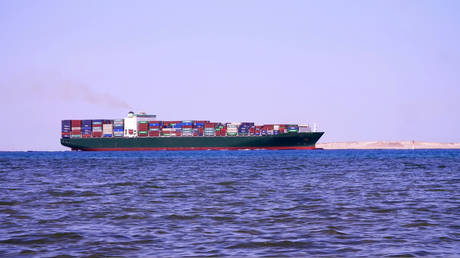 Russia and China reach shipping deal with Houthis – Bloomberg
Russia and China reach shipping deal with Houthis – Bloomberg
The Shia militia, which functions as the de facto armed forces of Yemen, has also vowed to disrupt commercial shipping in the Red Sea until Israel ceases its war with Hamas. Houthi militants have carried out scores of attacks on commercial shipping in the region, including a successful missile strike on an allegedly American-owned liquefied petroleum gas tanker on Tuesday.
From the outset of its campaign, the group said that it would target Israeli or “Israel-linked” shipping, including vessels owned or operated by American or British firms.
The US and Britain responded by deploying naval forces to the region and launching repeated waves of airstrikes against Houthi launch sites and other military facilities in Yemen. The most recent of these strikes took place on Monday, when US Central Command, which oversees American military operations in the Middle East, said that its forces destroyed missiles, drones, and “weapons storage containers” on Yemeni soil.
In a much larger series of strikes in late February, American and British warplanes destroyed 18 Houthi targets across eight locations in Yemen, including underground bunkers, radar sites, and surface-to-air missile batteries, according to the British Defense Ministry.
READ MORE: Red Sea attacks halving Suez Canal trade
These operations have failed to deter the militants, however. Back in January, US President Joe Biden conceded that while the air campaign was not “stopping the Houthis,” it would continue regardless.
Houthi attacks caused a 50% decline in shipping traffic through the Suez Canal in January and February, the International Monetary Fund (IMF) reported earlier this month. While most Western vessels are now forced to take the longer route around the Cape of Good Hope in South Africa, the Houthis have told Russia and China that their ships will be allowed to pass through the Red Sea unimpeded in exchange for unspecified “political support,” Bloomberg reported on Thursday.
-
Site: RT - News
Profits generated from Moscow’s frozen assets can be used to support the Ukrainian military, the chancellor has argued
German Chancellor Olaf Scholz has claimed that money generated from Russia’s frozen assets in the EU does not belong to anyone, arguing once again that it can be used by Brussels to purchase weapons for Ukraine.
Speaking to reporters ahead of an EU summit in Brussels on Thursday, Scholz insisted that the bloc needs to boost financial and military support for Kiev and increase ammunition production to keep up with Ukraine’s needs.
He suggested that apart from the funds set aside by member states, additional resources for purchasing weapons for Kiev could come from the “windfall profits” from Russia’s frozen assets.
“We are talking about proceeds that can be used because they do not belong to anyone and therefore can be used by the European Union,” he said, adding that these funds must be used with a “clear direction,” such as procuring ammunition for Ukraine.
Following the launch of Russia’s military operation against Ukraine in February 2022, the EU and other G7 nations froze over $300 billion worth of Russian foreign exchange reserves, with around $200 billion being held in the EU.
Read more Hungary against using Russian funds to arm Ukraine – DW
Hungary against using Russian funds to arm Ukraine – DW
In recent months, EU officials have begun discussing either completely seizing these funds and spending them on military support for Ukraine, or at least using the interest generated by the assets.
Initially, Brussels considered only using the windfall income to support the reconstruction of Ukraine after the end of the conflict. However, in light of Kiev’s difficult situation on the battlefield in recent months, EU officials, including the bloc’s top diplomat, Josep Borrell, have insisted on using Russia’s money for military support.
Earlier this week, Borrell proposed allocating 90% of the income from the funds to procure shells for Kiev and using the remaining 10% to support Kiev’s defense industry.
On Thursday, Scholz said he believes there is “broad unity” on the issue within the EU. However, according to a DW report earlier this week, the proposal could be blocked by Hungary. Unlike many of its EU peers, Budapest has not been blindly supportive of Ukraine in the conflict, refusing to send weapons to Kiev and opposing certain economic sanctions on Russia.
Moscow has warned that any actions taken against its assets would amount to theft. It has stressed that seizing the funds or any similar move would violate international law and undermine Western currencies, the global financial system, and the world economy.
-
Site: RT - News
Vessels from the two countries will not be targeted in the Red Sea or Gulf of Aden, the Yemen-based militant group has reportedly assured
The Yemen-based Houthi militants have told Russia and China that their ships can sail freely through the Red Sea and Gulf of Aden without fear of being attacked, Bloomberg reported on Thursday, citing sources.
People with knowledge of the matter told the outlet that the understanding was reached during talks in Oman involving Russian and Chinese diplomats and a top Houthi political figure.
According to Bloomberg’s sources, in exchange for promising safe passage for ships the Houthis want the two countries to provide political support for the rebel group in international bodies such as the UN Security Council.
The Houthi rebels have carried out dozens of drone and missile attacks on commercial vessels traversing the Red Sea, disrupting shipping traffic through one of the world’s most important maritime corridors. As a result, many major shipping companies have stopped using the Suez Canal and are instead redirecting ships around the Cape of Good Hope in southern Africa.
The Houthis have been attacking ships they believe to be linked to Israel in what they claim is a show of “solidarity” with the Palestinian people in light of the war in Gaza. After the US and the UK conducted a number of strikes on Houthi facilities in Yemen, the group said it would now also attack ships affiliated with both nations.
Read more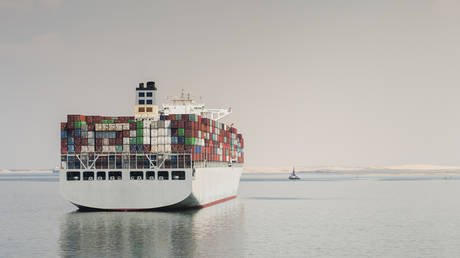 Red Sea attacks halving Suez Canal trade
Red Sea attacks halving Suez Canal trade
In a recent such incident, Yemeni missiles struck the merchant vessel True Confidence in the Gulf of Aden earlier this month, causing the first deaths since the militant group started its attacks. The Houthis claimed the vessel was American. However, according to a Bloomberg source, the ship used to be owned by Los Angeles-based Oaktree Capital, but a new non-US company had taken it over.
A senior Houthi political leader, Ali Alqhoom, declared recently on X (formerly Twitter) that the group’s goal is “sinking America, Britain and the West in the swamp of the Red Sea.”
Last week, the Houthis’ leader, Abdul Malik Al-Houthi, vowed to expand the campaign to the Indian Ocean and hit vessels traveling around South Africa.
Attacks on vessels in the Red Sea region decreased traffic via the Suez Canal, a vital route between Asia and Europe that ordinarily handles about 15% of global maritime trade.
-
Site: RT - News
Nearly 50% of Polish people disapprove of the country’s policies amid rallies against the EU green agenda and Ukrainian imports
Almost 50% of Polish people think their government has failed to handle ongoing widespread farmer protests, a recent survey has shown. Respondents to a survey assessing the first 100 days of the country's government also expressed dissatisfaction at how long the new coalition is taking to fulfill promises it made during the recent election campaign.
Polish farmers have been staging regular protests across the country, maintaining continuous blockades of border crossings with Ukraine since January. Farmers oppose restrictions placed on them under the EU's Green Deal and the continued flow of duty-free Ukrainian agricultural products, which they claim threatens their livelihoods.
Despite the authorities in Warsaw making certain concessions in a bid to appease the demonstrators, agricultural workers have refused to relent, arguing that the issue of unfair competition from cheap Ukrainian produce has not been fully addressed.
Polish legal and business daily Dziennik Gazeta Prawna reported the findings of a poll on Wednesday, conducted by the United Surveys research center between March 8 and March 10, surveying 1,000 Poles on the performance of Prime Minister Donald Tusk’s government.
According to the newspaper, 47% of respondents described the cabinet’s response to the farmers’ protests as a “defeat,” with 32% saying the measures adopted had been sufficient, and 21% giving no clear answer.
Read more EU extends tariff-free trade with Ukraine
EU extends tariff-free trade with Ukraine
Some 52.2% said they were unhappy with the slow pace of the implementation of electoral promises made by the incumbent government.
On Wednesday, tens of thousands of farmers descended on multiple Polish cities, including Warsaw, obstructing traffic on key roads and highways with their tractors and other heavy machinery. The organizers had vowed to “paralyze” the entire country.
According to local media, several roads leading to the German-Polish border were also blocked.
Police had previously estimated that 70,000 people would take part in more than 580 separate rallies across Poland on Wednesday.
Similar protests have taken place in several other EU countries since the start of the year.
Meanwhile, EU leaders provisionally decided to extend duty-free access to its markets for Ukraine until June 2025. The agreement includes an “emergency brake” on imports of poultry, eggs, sugar, oats, maize, groats, and honey, should those exceed the average levels of 2022 and 2023.
Polish farmers have opposed the move, insisting that years prior to the start of the Ukraine conflict, when volumes were much lower, should be used as the reference point.
-
Site: RT - News
Germany has given Kiev twice as much military aid as the UK, and Berlin has reportedly joined calls for London to do more
Kiev is “disappointed with Britain’s stance” on the conflict with Russia, sources in the UK defense sector have told the Daily Mail.
The UK is being overtaken by Germany and the Nordic states as Ukraine’s leading European backers, the industry operatives, who wished to remain anonymous, told the news outlet in an article published on Wednesday.
The sources also griped that Britain’s leaders are not coming across as bellicose enough compared to French President Emmanuel Macron, who has publicly refused to rule out deploying troops to Ukraine.
“The UK was the first country to give NLAW anti-tank rocket launchers, the first country to pledge tanks, so we received some leeway from Kiev,” one of the sources said. “But we are not pushing through capability thresholds any more. We’ve spent our political capital with [Ukrainian President] Vladimir Zelensky and we are not spending enough on military aid.”
“The Ukrainians are disappointed with Britain’s stance at the moment. Germany has also told the UK it has to do more. From where we once were, it is galling to be told that,” they added.
Read more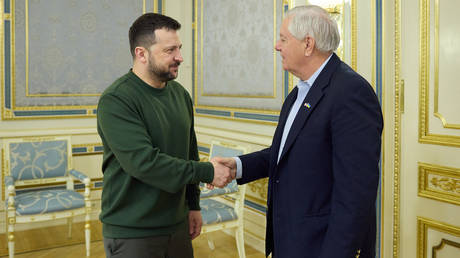 Ukraine ‘offended’ by US talk of loans – Politico
Ukraine ‘offended’ by US talk of loans – Politico
The UK has delivered less than €5 billion ($5.4 billion) in military aid to Ukraine since 2022, while Germany has sent €9.36 billion and the Scandinavian states – Denmark, Finland, Sweden, and Norway – have sent a combined €9.12 billion, according to a report from the Kiel Institute for the World Economy. When promises of future aid are fulfilled, the UK will have sent €9.12 billion, while Germany will have delivered €17.7 billion.
The identity of the Daily Mail’s sources is unclear, as is the veracity of their comments. The Mail has openly lobbied the British government to increase military spending before, most recently when it announced its ‘Don’t Leave Britain Defenceless’ campaign earlier this month. Backed by a number of hawkish former defense chiefs, the campaign calls on the government to spend 2.5% of the UK’s GDP on its military, up from 2% at present.
Speaking at a NATO summit last July, Britain’s then-defense minister, Ben Wallace, complained that London would like “to see a bit of gratitude” from Kiev for the military aid sent by the UK. Wallace’s comments were sarcastically dismissed by Zelensky, before the minister walked them back and insisted that he was not speaking for himself, but for “citizens and MPs across the international community.”
READ MORE: EU state to send more old Leopard tanks to Ukraine – media
“The UK continues to lead military support for Ukraine as the first country to provide lethal aid as well as the first to provide Western main battle tanks and long-range precision strike capability,” the British Defense Ministry told the Daily Mail. “We have committed more than £7 billion [$8.8 billion] of military support to Ukraine, including £2.5 billion in 2024/25.”
-
Site: RT - News
The Gaza war and a series of public Quran burnings have led to a heightened risk, Denmark’s security and intelligence agency says
The threat of terrorism in Denmark has “intensified” over the past year and remains ‘serious’ – the second highest of five levels – the national security and intelligence agency (PET) said on Thursday.
A fresh report by PET cited incidents in which copies of the Quran were desecrated last year, and Israel’s military operation in Gaza as the main factors that have contributed to the increased threat, which it described as having “intensified within the current level.”
The high number of civilian deaths in the Palestinian enclave as a result of the military action, which Israel claims to be aimed at eliminating the militant group Hamas, “stirs emotions” in many people, said Michael Hamann, the head of PET’s Center for Terrorism Analysis.
The war “contains a significant potential for radicalization and mobilization, which can potentially lead to spontaneous or planned actions in Denmark, including terrorist attacks,” he warned.
Read more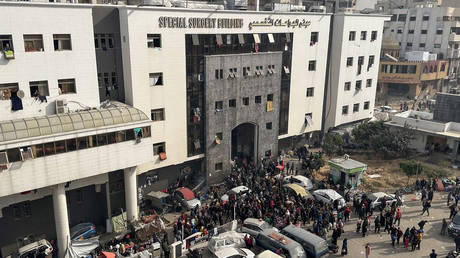 Israeli military raids Gaza’s largest hospital
Israeli military raids Gaza’s largest hospital
Israel launched its military campaign last October, responding to a deadly incursion into southern Israel by Hamas. The estimated Palestinian death toll has since surpassed 30,000 – and more than 70% of Gaza’s population is facing “catastrophic hunger,” according to a recent UN-backed report.
Hamann also referred to a series of Quran burnings and other publicity stunts purportedly defending free speech in the EU over the past year. The Danish parliament passed a law last December, criminalizing the “inappropriate treatment” of religious texts, effectively outlawing such protests.
According to the security official, “even minor incidents in Denmark” involving the Quran “can spark global reactions,” considering how fast and wide information can spread online. The country raised its terrorist threat level to its current position last August amid a backlash over the book burnings. Sweden’s national security service also raised its terrorist alert to the second-highest level last August, citing the same reason.
READ MORE: EU country bans Quran-burning
Hamann said the threat was likely to remain high “for at least the coming year,” as Denmark is seen as a “priority target” for terrorist activity.
-
Site: RT - News
Beijing has said it has no intention of using force, unless provoked by the leaders of the self-administered island
The Chinese military is on track to meet a supposed 2027 deadline for a ground operation in Taiwan, a senior US Navy official has told Congress.
Beijing considers the self-governed island to be part of China. Its stated policy is to seek peaceful reunification, but has warned that it will resort to military action if the US-backed administration of Taiwan attempts to declare formal independence.
On Wednesday, Admiral John Aquilino, who leads the US Indo-Pacific Command, spoke at a session of the US House Armed Services Committee about the readiness of the People’s Liberation Army of China (PLA) seize Taiwan. In prepared remarks, he labeled China an “adversarial regime” and “the only country that has the capability, capacity, and intent to upend” the status quo in the Pacific.
Read more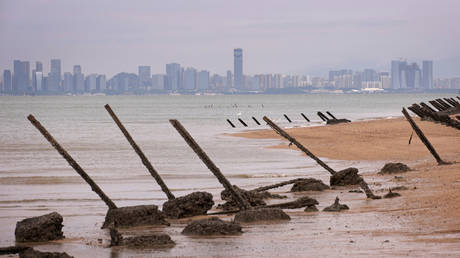 Taiwan confirms presence of US special forces
Taiwan confirms presence of US special forces
“All indications point to the PLA meeting President Xi Jinping’s directive to be ready to invade Taiwan by 2027. Furthermore, the PLA’s actions indicate their ability to meet Xi’s preferred timeline to unify Taiwan with mainland China by force if directed,” Aquilino said.
The purported directive has been alluded to by senior US officials, including CIA Director William Burns, who mentioned it on several occasions in 2023. American military commanders have suggested for years that 2027 may be the time of a decisive conflict for Taiwan, with a 2035 deadline discussed as well. Last April, at another committee hearing, Aquilino said he believed “everybody is guessing” regarding the issue.
Xi reportedly raised the American claims during a meeting with US President Joe Biden in San Francisco last November. The Chinese leader “denied any near-term plans to use force” against Taiwan, mentioned the two purported deadlines, and rejected these statements with “a hint of irritation” in his voice, a senior White House official said, describing the talks to Voice of America on condition of anonymity.
READ MORE: US scraps airborne directed-energy weapon program – media
When asked about the latest assessment on Thursday, Chinese Foreign Ministry spokesman Lin Jian dismissed the attempts by “some people in the US” to “hype up the China-threat narrative to escalate tensions across the strait and instigate confrontation.” The island’s status is a domestic Chinese issue, he said.
-
Site: RT - News
As America braces for a potential war with China, a laser-armed gunship for use against militants seems useless, The War Zone says
The US Air Force has suspended its attempts to put a 60kw-class laser weapon on the AC-130J, its close air support aircraft, The War Zone said on Tuesday.
The military news outlet has received confirmation that the Airborne High Energy Laser (AHEL) program has been scrapped directly by the Air Force Special Operations Command (AFSOC). It linked the decision to the retooling of the Pentagon’s arsenals for potential conflicts with peer competitors, such as China.
The Lockheed AC-130 is a version of the C-130 Hercules transport, which the US has been using for over five decades in ground attack operations. The current AC-130J Ghostrider version was introduced in 2015. AHEL was supposed to add a directed energy weapon to the toolkit available for the aircraft.
The War Zone argued that AHEL was axed after years of delays because the Pentagon is preparing for “high-end” warfare, as opposed to counter-insurgency operations. The laser system was touted as an efficient way to deal with militants in an environment where US air superiority is not challenged.
Read more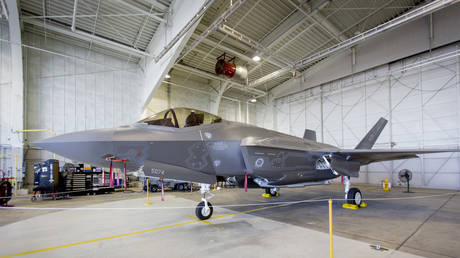 F-35 defeated by flashlight
F-35 defeated by flashlight
The same reasoning applies to the potential removal of 105mm howitzers from the fleet of AC-130Js, which was mentioned in the Pentagon’s latest budget request, the report said. As of last November, only 17 of the 30 aircraft had received this upgrade, it added.
The $849.8 billion request by the Department of Defense for fiscal year 2025 was published last week. It included no new funding for AHEL, indicating its imminent termination, according to The War Zone.
Lockheed was awarded the contract for AHEL integration with the AC-130J in 2019 and was initially expected to commence flight testing of the weapon in fiscal year 2021. That year, the defense giant described the successful factory acceptance testing of the system as a “tremendous accomplishment.”
“After accomplishing significant end-to-end high power operation in an open-air ground test, the AHEL solid state laser system experienced technical challenges,” AFSOC told the website in a statement. “These challenges delayed integration onto [the] designated AC-130J Block 20 aircraft past the available integration and flight test window.”
READ MORE: Beijing points to greatest challenge facing the US
AFSOC added that the program has been “re-focused on ground testing to improve operations and reliability to posture for a successful hand off for use by other agencies,” saying any further questions should be directed to the US Special Operations Command.
-
Site: RT - News
The former US president is reportedly concerned about developing dementia after his father suffered from the fatal disease
Former US President Donald Trump has a fear of developing dementia due to his father’s battle with Alzheimer’s disease, according to the Washington Post, which cited several of the billionaire’s former associates.
The outlet claimed to have spoken to a former senior executive at the Trump Organization, who said they had seen Donald Trump interact with his father Fred Trump Sr. Speaking on condition of anonymity, the source claimed that “Donald is no doubt fearful of Alzheimer’s.”
“He’s not going to talk about it and not going to admit it,” they told WaPo, claiming that this information was nevertheless relevant in light of Trump’s allegations that current US President Joe Biden is not mentally fit for office.
WaPo also cited Trump’s niece, Mary L. Trump, who reportedly recalled that Donald was seriously upset by his father’s descent into dementia after the patriarch failed to recognize his children at a family gathering in the mid-1990s.
The outlet also cited an interview that Donald Trump gave to Playboy in 1997, in which he stated that seeing his father suffering from Alzheimer’s had left him wondering “out loud about the senselessness of life.”
In recent years, Trump has repeatedly claimed that US President Joe Biden was suffering from severe mental health issues as he could often be seen tripping, getting lost, mixing up world leaders and countries, losing his train of thought mid-sentence, and most recently forgetting NATO’s new ally in confusing Norway with Finland. At the same time, the billionaire has boasted that he himself had passed the Montreal cognitive test with flying colors.
Read more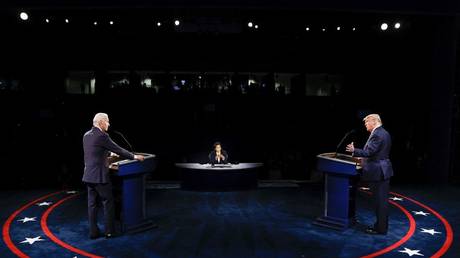 Biden and Trump secure nominations
Biden and Trump secure nominations
However, some have suggested that Trump’s own mental health may also be slipping, after several gaffes on the campaign trail in recent months, such as confusing South Carolina Governor Nikki Haley with former speaker Nancy Pelosi, and warning that the US could face “World War II” under Biden.
Meanwhile, a recent survey by the Associated Press-NORC Center for Public Affairs Research found that 63% of American voters are not very or not at all confident in Biden’s mental capability to serve effectively as president. Trump also did not fare well, with 57% voicing concerns about his mental capacity.
The pair are now set to face off in the upcoming US presidential election, which will be held on November 5.
-
Site: RT - News
The Israel Defense Forces claims to have killed 90 Hamas militants but the group says all of the victims were patients
The Israel Defense Forces (IDF) has raided Gaza’s largest medical facility, Al Shifa hospital, claiming to have killed 90 Hamas militants and seized cash belonging to the group. However, Hamas says all of the victims were patients at the hospital.
Since Israel launched its massive military campaign in Gaza in response to the deadly incursion on October 7 by Hamas, the IDF has conducted multiple assaults on the hospital. When it first raided the medical complex in November 2023, Israel claimed that Al Shifa was being used as a command center by Hamas militants.
Both the Islamist group and staff at the hospital denied the allegations, with Israel attracting international criticism over the operation.
In a message posted on its Telegram channel on Wednesday, the IDF stated that “as part of the searches at the hospital, the forces located 11 million shekels in USD and Jordanian Dinars ($3 million) that were earmarked for terrorism.”
Read more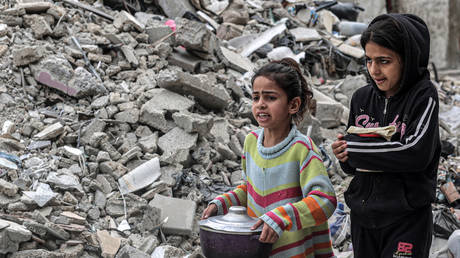 ‘Catastrophic’ hunger has gripped Gaza – global watchdog
‘Catastrophic’ hunger has gripped Gaza – global watchdog
Israeli troops also detained more than 300 people, according to the statement, some of whom are believed to be “senior terrorists and those with key positions.” The IDF also claimed that its forces had delivered food and water to Palestinian civilians.
In a separate post on X (formerly Twitter), the Israeli military claimed to have “eliminated approx. 90 terrorists” at the hospital, “while preventing harm to patients, staff and equipment.”
Israel launched the raid in the early hours of Monday, claiming that Hamas militants had taken refuge in the medical facility.
The head of Gaza’s Hamas-controlled government media office, Ismail Al-Thawabta, suggested that Israeli troops had killed patients and civilians who were taking cover at Al Shifa.
“The Israeli occupation army practices lying and deception in spreading its narrative as part of justifying its continuous and law-breaking crimes, which violate international law, international humanitarian law,” the official alleged.
On Monday, Gaza’s Hamas-run Health Ministry wrote on its Telegram channel that Israeli military personnel were “directly shooting the specialized surgeries building with bullets and targeting it with missiles.” The attack had resulted in an unspecified “number of martyrs and wounded” by that stage, the statement read, adding that anyone “who tries to move is targeted by sniper bullets and quadcopters.”
-
Site: RT - News
Paris must give Kiev “the means to enter negotiations” with Moscow, the three-time presidential candidate has insisted
The conflict in Ukraine does not directly affect France’s key national interests, the former leader of the far-right National Rally party, Marine Le Pen, told the BFM TV broadcaster on Wednesday. Le Pen, who led the party for more than a decade argued that “France’s vital interests are not in question.”
The three-time presidential candidate also suggested that Russia does not pose a threat to European nations and that the best thing Kiev’s Western backers can do is ensure that it sits down at the negotiating table with Moscow as soon as possible.
According to the politician, “the only way to help Ukraine is to give it the means to enter into negotiations.”
Late last month, French President Emmanuel Macron said that, while there was no consensus among Kiev’s backers on a military deployment to Ukraine, “in terms of dynamics, we cannot exclude anything.” Numerous NATO allies were quick to reject his suggestion. However, reports have since appeared in the media, claiming that Paris may have been preparing for such a development for months.
Reports have also alleged that active-duty military personnel from NATO states are already operating in Ukraine in various capacities – something that Polish Foreign Minister Radoslaw Sikorski appeared to confirm on Wednesday.
Read more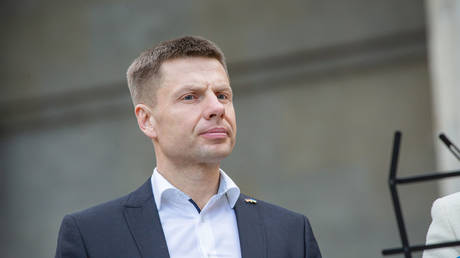 France considering Ukraine military deployment – Odessa MP
France considering Ukraine military deployment – Odessa MP
Le Pen accused Macron of “playing politics with war,” suggesting that the head of state may not be fully aware of what is going on on the battlefield in Ukraine.
She also argued that Moscow was unlikely to attack European countries as it “does not have the military means to engage in a territorial war with the whole” of the continent.
Last week, French legislators voted in favor of a 10-year security pact with Ukraine, which was signed by Macron and his Ukrainian counterpart, Vladimir Zelensky, last month. National Rally abstained, with Le Pen accusing the head of state of “hijacking, exploiting and instrumentalizing a major international crisis for a short-term electoral agenda.”
She has consistently opposed plans to admit Ukraine into NATO and the EU, as well as economic sanctions on Russia, and the delivery of heavy weapons to Kiev.
On Tuesday, the head of Russia’s Foreign Intelligence Service (SVR), Sergey Naryshkin, claimed that France was preparing to deploy as many as 2,000 troops to Ukraine.
Over the weekend, Russian President Vladimir Putin told his supporters that fighters from NATO states were already present in Ukraine. He also said a conflict between NATO and Russia could not be ruled out, but added that everyone probably understood the dire consequences of such a development.
-
Site: RT - News
Up to 20 additional vehicles are to be refurbished and transferred by Spain, according to local reports
Spain will donate up to 20 mothballed Leopard 2A4 main battle tanks to Ukraine, adding to the ten sent last year, local media reported this week. The EU nation has a stockpile of over 100 of the vehicles manufactured in the late 1980s.
The news was first reported by Spanish outlet ABC, after Prime Minister Pedro Sanchez chaired a high-profile meeting with executives of national defense contractors.
Last year, Sanchez authorized donating ten of the German-designed tanks to Kiev despite the objections of Podemos, his left-wing party junior coalition partner at the time.
The new shipment will be drawn from storage, where they have been kept for the last decade, and refurbished at a factory in Seville before being transferred to Kiev, ABC said. The report offered no specific timeline, but said the deliveries would happen over the coming months.
Read more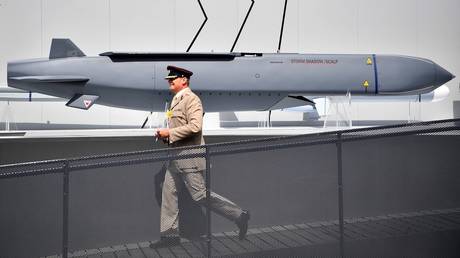 NATO troops active in Ukraine – El Pais
NATO troops active in Ukraine – El Pais
A list of previous Spanish military aid to Ukraine was revealed by Secretary of State for Trade Xiana Mendez earlier this week. Local media estimated the value of the armaments at €133 million ($145 million). The list included items ranging from night vision goggles to the ten Leopard tanks, dispatched by the Defense Ministry between March 2022 and the end of February this year.
Forbes noted that the new armor donation had been anticipated, considering that as of 2022 Spain had more than 100 of the vintage Leopard 2A4s acquired from German surplus stock in 1998. Santa Barbara Sistemas, the manufacturer that operates the plant in Seville, has produced more than 200 Leopard tanks of the newer 2E version.
Added to the additional 14 Leopard 2A4 tanks pledged by Germany and the Netherlands, the Spanish donation would allow Kiev’s 33rd Mechanized Brigade to replenish its fleet eroded by battlefield losses and breakdowns, the magazine said.
Moscow has warned that whatever Western military assistance Ukraine receives cannot change the outcome of the conflict. It perceives the hostilities to be part of a US-led proxy war on Russia and has said that it will not compromise on its national security goals.
READ MORE: Another Abrams tank destroyed in Donbass – MOD
”For us [the Ukraine conflict] is a matter of life and death; for them it’s a matter of improving their tactical position [globally and in Europe],” President Vladimir Putin said in an interview last week.
-
Site: RT - News
The first batch of the fighter jets will arrive from Denmark this summer, Dutch Defense Minister Kajsa Ollongren says
The West will deliver the first batch of F-16 fighter jets to Ukraine within the next several months, with more to come later this year, Dutch Defense Minister Kajsa Ollongren has said.
Denmark will be the first Western country to supply Ukraine with the advanced aircraft, with the Netherlands to follow soon afterwards, the defense minister revealed in an interview with Reuters on Wednesday, as she wrapped up her visit to Kiev.
“I’m very confident that we will start delivering F-16s this summer... Denmark first, and we have a schedule ... so in the second half of the year, the Dutch F-16s will be going this way,” Ollongren said, without providing details on how many jets would be included in the first shipments.
She added that it will not be easy for the West to provide Ukraine with all the aid it needs, as the US struggles to approve President Joe Biden’s assistance package earmarking $60 billion for Kiev. Republican lawmakers have opposed the move, demanding that the White House do more to enhance US border security.
Read more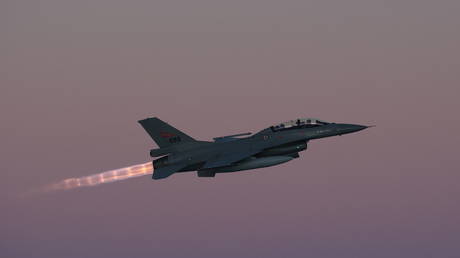 NATO states will break F-16 pledge to Ukraine – NYT
NATO states will break F-16 pledge to Ukraine – NYT
Ollongren also called for ammunition production in the EU to be ramped up amid Ukraine’s complaints that it suffers from a lack of munitions.
“We have to be realistic, and consider the possibility that it might be a lengthy war, and it is better to plan for a long war,” she said.
Western countries announced an international coalition to help Ukraine procure US-designed F-16s and train its pilots last year, with plans to provide Kiev with more than 40 aircraft.
Denmark has pledged to send Kiev 19 jets of this type. The Netherlands initially promised 18, but later increased the number by six.
Media reports indicate that Norway could send Kiev five to ten F-16s, with Belgium pledging to support Ukraine with an undisclosed number.
Ukrainian officials, however, have warned that the country could face infrastructure difficulties in maintaining the US-designed jets. NATO Secretary-General Jens Stoltenberg said in November that while the F-16s will certainly add to Ukraine’s capabilities, they will not be “a silver bullet” to fundamentally change the battlefield situation.
Russia has warned the West that arms shipments to Ukraine will only prolong the conflict without changing the ultimate outcome. Foreign Ministry spokeswoman Maria Zakharova has also said that F-16s would be “legitimate targets” for the Russian military, adding that the shipments will only increase the risk of a direct clash between Moscow and NATO.
-
Site: RT - News
Chancellor Olaf Scholz has claimed Russia is making a mistake if it believes Berlin will waver in its support for Kiev
Germany will not let Russian President Vladimir Putin forcibly alter Ukraine’s borders or impose the terms of peace, Chancellor Olaf Scholz has vowed.
Speaking to lawmakers in Berlin on Wednesday, Scholz insisted Germany “will not accept a dictated peace at the expense of Ukraine.”
“Law is stronger than violence,” the chancellor said, claiming that Putin had sought to violate that principle with the launch of Russia’s military operation against Ukraine in February 2022. “We will not let him get away with this,” he added.
Scholz insisted that Germany’s backing of Ukraine will not decrease, and that expecting otherwise would be a “miscalculation.”
He reiterated his criticism of Putin’s reelection last weekend for a fifth term as president, saying it showed that “Russia is not strong.”
However, as EU foreign policy chief Josep Borrell acknowledged in an interview on Wednesday, European allies will be hard-pressed to fill the funding gap if Kiev’s biggest backer, Washington, reduces its support. US President Joe Biden’s administration ran out of funding for Ukraine in January and has struggled to secure congressional approval for over $60 billion in additional military and financial aid.
Read more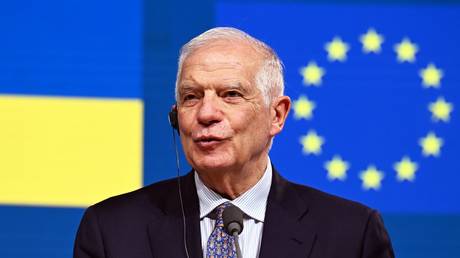 EU’s Borrell warns of Ukraine funding vacuum if US stops spending
EU’s Borrell warns of Ukraine funding vacuum if US stops spending
Scholz made his comments ahead of an EU summit scheduled to begin on Thursday in Brussels. Major topics of discussion will include efforts to ramp up aid to Ukraine, as well as the bloc’s response to the Israel-Hamas war. Russian forces have made battlefield gains in recent weeks, and US defense chief Lloyd Austin warned on Tuesday that Ukraine’s very survival will be at risk if the West fails to provide more weapons to Kiev.
Even as he lobbies allies for more Ukraine aid, Scholz has resisted political pressure to provide Kiev with long-range Taurus missiles, saying that such an escalation could draw Germany into a direct conflict with Russia. Speaking at the Bundestag on Wednesday, he told lawmakers that debate within Germany over the Taurus issue is “nothing short of ridiculous.” He added that the controversy isn’t well understood outside of Germany, describing it as “embarrassing for us as a country.”
-
Site: RT - News
State police have been blocked from arresting illegal migrants, hours after the US Supreme Court gave them the green light
The implementation of a new Texas law enabling the state to arrest and expel illegal migrants has again been put on hold, after a federal court ordered it temporarily blocked pending the outcome of a legal challenge from President Joe Biden’s administration.
The 5th Circuit Court of Appeals imposed the latest delay on Tuesday, just hours after the US Supreme Court rejected the Biden administration’s emergency request to halt the enforcement of the Texas law.
The legal whiplash will temporarily maintain the status quo while Texas Governor Greg Abbott feuds with the White House over the influx of migrants across the border with Mexico. Although border security normally falls under the jurisdiction of the federal government, Abbott has invoked the state’s constitutional right to self-defense, arguing that Biden’s dereliction of duty has triggered a migrant “invasion.”
Read more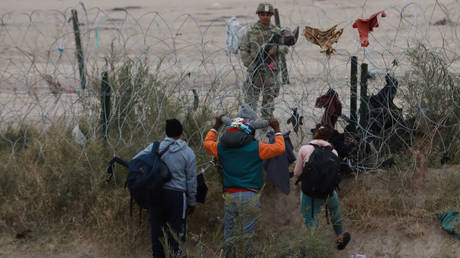 Civil war 2.0: What’s behind the latest escalation between Washington and Texas?
Civil war 2.0: What’s behind the latest escalation between Washington and Texas?
On Wednesday, a three-judge 5th Circuit panel heard arguments from both sides on whether the controversial Texas law should go back into effect while the broader case is still pending. The Biden administration has insisted that only the federal government has jurisdiction over border security.
The new law, known as SB4, makes it a state crime to cross into Texas from Mexico outside legal ports of entry. First-time offenders could be punished with up to six months in jail, while repeat violators could be sentenced to a 20-year term. Judges would have the power to order migrants to return to Mexico or face prosecution if they don’t leave willingly.
SB4 has been part of a broader push by Abbott to help secure his state’s portion of the US-Mexico border. Upon taking office in January 2021, Biden immediately halted the border security initiatives of his predecessor, Donald Trump. Since then, the US has seen a record influx of illegal migrants and suspected terrorists, as well as increases in drug trafficking.
READ MORE: 25 US Republican governors back Texas in standoff with Biden
Texas has strung barbed wire along the border and installed floating barriers in the Rio Grande River to help stem the flow of migrant traffic. Abbott has also deployed the National Guard to seize control of a state-owned park, seal off a popular crossing for illegal migrants, and prevent federal officers from removing the installed barriers.
The governor noted on Wednesday that even with SB4 temporarily paused, Texas police have been arresting illegal migrants for other crimes, such as criminal trespass. More than 41,000 such arrests have been made during the state’s $12 billion ‘Operation Lone Star’ crackdown.
-
Site: RT - News
Britain has ruled out a “full-blown military deployment,” Prime Minister Rishi Sunak’s spokesman has said
London has no plans to send troops to fight Russia alongside Ukrainian soldiers, a UK government spokesman told TASS news agency on Wednesday.
The comment came after French President Emmanuel Macron said he would not rule out an eventual presence of NATO troops on Ukrainian soil, as the conflict between Kiev and Moscow continues.
The French leader initially floated the idea in late February and later doubled down, describing Russia as an “adversary.” He denied that Paris was “waging a war” against Moscow, however.
Following Macron’s statements, Le Monde reported that France had been contemplating the idea of deploying troops since at least June 2023.
The head of Russia’s Foreign Intelligence Service (SVR), Sergey Naryshkin, said on Tuesday that Paris is preparing to send around 2,000 soldiers to Ukraine.
London has no such plans, a spokesman for UK Prime Minister Rishi Sunak’s office told TASS. British soldiers will not “fight side by side” with Ukrainians, the official stated, adding that the government has ruled out a “full-blown military deployment.”
Read more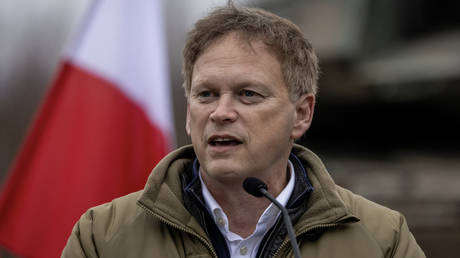 West poses no threat to Russia – UK defense chief
West poses no threat to Russia – UK defense chief
The UK government told reporters last month that it would not send additional troops “beyond the small number of personnel we do have in the country supporting the armed forces of Ukraine.”
Commenting on a potential NATO deployment to Ukraine earlier this week, Russian President Vladimir Putin warned that this would be “one step shy of a full-scale World War III.”
NATO member states have also said they have no plans to send troops to Ukraine. The US-led bloc has maintained that it does not wish to become a party to the conflict, but will continue to support Kiev with arms and money for “as long as it takes.”
READ MORE: France considering Ukraine military deployment – Odessa MP
Russia has warned that the delivery of Western weapons already makes NATO countries de facto participants in the conflict and risks further escalation. Putin said last month that Moscow has no intention of attacking NATO members, unless it is attacked first.
-
Site: RT - News
If the negotiations are successful, the WikiLeaks founder could reportedly walk free having already served time in a British prison
The US Justice Department is considering whether to allow WikiLeaks founder Julian Assange to plead guilty to a misdemeanor offense in order to avoid extradition to the US on espionage charges, the Wall Street Journal reported on Wednesday.
The potential deal would see Assange plead guilty to mishandling classified information, with the five years he has already served in London’s Belmarsh Prison counting as his sentence, the unnamed sources told the newspaper.
Assange’s lawyers and US officials have held preliminary talks in recent months to sketch out a possible bargain, the sources said. However, Barry Pollack, a lawyer for the jailed journalist, told the newspaper that “there are no signs” that the department is ready to accept the deal.
If a deal were reached, it would end a legal battle in play for more than a decade. After his arrest by British police in 2010 for sexual offense allegations that he denied, Assange jumped bail in 2012 and was granted asylum in the Ecuadorian embassy in London. He was arrested again in 2019 when Ecuador revoked his asylum, and has remained in Belmarsh ever since.
Read more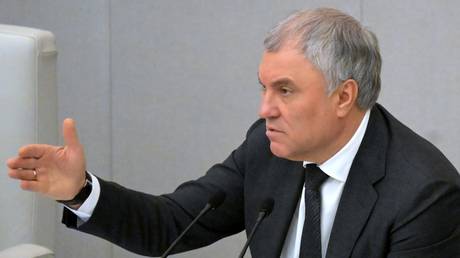 Russia’s top MP calls out Western hypocrisy on Assange
Russia’s top MP calls out Western hypocrisy on Assange
The Justice Department unsealed an indictment against Assange on the day of his arrest, charging him with 17 counts of espionage. If extradited to the US and convicted, the former WikiLeaks boss faces up to 175 years in prison.
The charges stem from his publication of classified material obtained by whistleblowers, including Pentagon documents detailing alleged US war crimes in Iraq and Afghanistan.
The UK Home Office approved his transfer to American custody in 2022, but Assange – now in poor health after nearly five years of solitary confinement – has filed repeated appeals, none of which have been successful. Last month, Britain’s High Court postponed a decision on granting Assange a final chance to appeal his extradition.
Washington’s use of the Espionage Act to prosecute Assange is controversial, as the Australian-born journalist published, but did not steal, the classified material in question. Former US President Barack Obama refused to press charges against Assange for this very reason, arguing that his activity was no different from that of any newspaper, and was therefore protected by the First Amendment of the US Constitution.
READ MORE: Pentagon leaker agrees to 16-year prison sentence
With an election coming up this November, US President Joe Biden is keen to avoid the “political hot potato” of an extradited journalist arriving in Washington to face criminal prosecution, the Wall Street Journal wrote. Furthermore, American “prosecutors face diminishing odds that he would serve much more time even if he were convicted stateside,” the paper noted.
-
Site: RT - News
The US environmental regulator has finalized rules that could force a ninefold increase in the market share of electric vehicles
US President Joe Biden’s administration has followed through on its pledge to accelerate the phaseout of cars powered by internal combustion engines, unveiling new emissions rules that may force the nation’s auto industry to be dominated by electric vehicles (EVs) in less than a decade.
The US Environmental Protection Agency (EPA) released its new emissions standards for passenger vehicles on Wednesday, laying out limits that will start getting tougher in 2027 and ratchet further downward through 2032. The agency said that under one scenario, its 2032 standard could be met if 56% of new cars and trucks sold are EVs and 13% are plug-in hybrids.
EVs accounted for just 7.6% of new vehicle sales in the US last year, meaning the new rules may necessitate a ninefold increase in the segment’s market share. The guidelines are designed to allow automakers to choose the emissions-control technologies they will use to be in compliance, EPA administrator Michael Regan said. However, the industry has already largely given up on hydrogen fuel cells to power its vehicles, so EVs figure to be the primary solution.
Read more Global electric car sales slowing – data
Global electric car sales slowing – data
“With transportation as the largest source of US climate emissions, these strongest-ever pollution standards for cars solidify America’s leadership in building a clean transportation future and creating good-paying American jobs – all while advancing President Biden’s historic climate agenda,” Regan said. He claimed that the new mandates will reduce greenhouse-gas emissions by more than 7 billion tons over the next three decades.
It’s not clear whether the EPA’s estimates include the emissions that will result from increased generation of electricity to charge millions of new EVs. Coal, natural gas and other fossil fuels accounted for about 60% of the nation’s power generation last year, according to the US Energy Information Administration. And as the EPA has acknowledged, studies have shown that the production of EVs and their batteries generates higher emissions than the manufacturing of conventional cars.
Critics of the new mandates have argued that Biden is essentially forcing US consumers to buy cars that many don’t want or can’t afford. “The Biden administration is deciding for Americans which kind of cars they are allowed to buy, rent and drive,” said Senator Shelley Moore Capito, a West Virginia Republican. She added that the new rules mandate an “unrealistic transition” to EVs and threaten a power grid that is already being weakened by EPA-driven shutdowns of fossil-fueled generators.
-
Site: RT - News
The move could help unlock funds for domestic development of the fuel for next-generation nuclear reactors, the energy secretary has reportedly said
US Energy Secretary Jennifer Granholm has called on Congress to ban uranium supplies from Russia in order to support domestic development of the fuel for next-generation nuclear reactors, according to a report by Reuters.
In December, US lawmakers tried to introduce a ban on imports of Russian uranium as part of the sanctions campaign against Moscow over the Ukraine conflict. The bill, however, stalled in the Senate.
Under a deal struck by lawmakers, passing the ban would unlock funds to expand domestic uranium enrichment and to produce a special uranium fuel called high assay low enriched uranium, or HALEU, for next-generation reactors.
“Hopefully we can get that ban in place in order to unlock” those funds, Granholm was quoted as telling a House of Representatives hearing on Wednesday. “I strongly hope and encourage that Congress does that so that we can move with alacrity,” she reportedly said.
Official statistics show the US imported $1.2 billion worth of Russian uranium last year, the most ever on record. According to RIA Novosti, the purchases doubled in December, to $193.2 million, following the attempt to ban Russian supply. The total value of uranium shipments for the year was up by 43%.
Russia has remained America’s top supplier of uranium in monetary terms and is the fourth largest in terms of volume, with Canada having the top spot, according to calculations by S&P Global.
READ MORE: US bought record amount of Russian uranium in 2023 – media
The US has its own deposits of uranium, but they are not sufficient to supply the country’s nuclear power sector. Meanwhile, Russia has the world’s largest uranium enrichment complex, accounting for almost half of global capacity. According to some estimates, it would take at least five years of heavy investment for the US to break its dependence on Russian imports of enriched uranium used to fuel nuclear reactors.
-
Site: RT - News
The sinking of a South Korean vessel has left at least eight crewmen dead and two missing
At least eight crewmen have been killed and two left missing after a South Korean chemical tanker capsized near an island just off the western Japanese coast.
The vessel, named the Keoyoung Sun and owned by South Korea’s Keo Young Shipping Co., sent out a distress call on Wednesday morning near Mutsure Island, according to the Japanese Coast Guard. It was reported to be tilting to one side after anchoring in rough seas and high winds near Mutsure, to the west of Shimonoseki, a port city at the southwestern tip of Japan’s biggest island.
The 28-year-old tanker was loaded with 980 tons of acrylic acid and was operated by a crew of two South Koreans, eight Indonesians and one Chinese national. It was completely capsized by the time Japanese rescuers arrived on scene. The Japanese Coast Guard recovered one surviving crewman, an Indonesian, and the bodies of eight who perished. Two others were still missing as of Wednesday evening.
Read more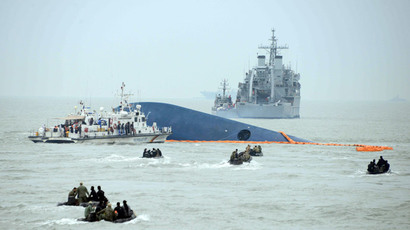 Newly released footage details students' last moments aboard sinking S. Korean ferry
Newly released footage details students' last moments aboard sinking S. Korean ferry
Japanese media showed images of the ship floating upside down with seawater washing over its red underside. At the time of the incident, the Keoyoung Sun was reportedly bound from the Japanese port of Himeji to Ulsan, one of South Korea’s largest refining and petrochemical hubs. Its captain was South Korean.
The incident comes about one month after an LNG carrier and an overloaded cargo ship collided off South Korea’s southern coast. All 77 people on board the two vessels were rescued. Also last month, 11 crewmen were rescued from a sinking cargo ship in high winds and rough seas near South Korea’s Jeju Island.
A South Korean oil-products tanker sank in October 2022 after taking on water off the coast of Taiwan. One crew member died, and 19 were rescued. South Korea’s worst maritime accident occurred in 2014, when the capsizing of a ferry carrying students on a high school field trip left more than 300 people dead.
-
Site: RT - News
Several member states have balked at the provisional agreement and have asked for more time, according to a report
EU ambassadors have failed to endorse a decision to extend preferential trade rules for Ukraine for another year, Politico reported on Wednesday, citing sources.
The ambassadors were expected to approve a provisional agreement on Wednesday to grant Ukrainian food producers tariff-free access to EU markets until June 2025.
However, several countries – particularly France – asked for more time to assess the impact of the deal, according to unnamed EU diplomats and officials cited by the outlet. This could come as a blow on the eve of Thursday’s EU summit, at which leaders want to “show solidarity” with Ukraine, the report argued.
Shortly after the launch of Moscow’s military operation in Ukraine, the European Commission temporarily lifted all duties and quotas on Ukrainian goods for a period of one year to allow its agricultural products to be shipped to global markets.
However, much of the supply has instead flooded Eastern European countries, destabilizing markets in the bloc and endangering the livelihoods of local farmers. In 2023, Brussels prolonged the measure for another year despite angry protests from EU farmers who were hurt by the flow of cheap Ukrainian agricultural products.
In January, the European Commission proposed suspending duties and quotas on Ukrainian farm produce for another year. However, an ‘emergency brake’ provision was included for poultry, eggs and sugar, meaning that tariffs would be imposed if imports exceeded the average levels of 2022 and 2023.
Read more France backs push to curb grain imports from Ukraine – Politico
France backs push to curb grain imports from Ukraine – Politico
Negotiators for the European Parliament and the Belgian EU presidency agreed in the early hours of Wednesday to add oats, maize, groats, and honey to the list, while keeping the reference years as 2022 and 2023. The new measures were also supposed to require the European Commission to act more quickly in the event of a surge in imports.
“The agreement is still not what we wanted it to be,” French Agricultural Minister Marc Fesneau stated on X (formerly Twitter). He added that solidarity with Ukraine should not come “at the cost of excessive destabilization” of the European markets.
Meanwhile, in a separate vote early on Wednesday, lawmakers on the European Parliament’s trade committee approved the initially struck compromise.
The decision to hold a vote “caught some lawmakers by surprise,” as they usually have to wait for the green light from ambassadors to approve the text, Politico pointed out.
“It bears the risk of institutions having to return to the negotiating table if ambassadors – who will reconvene next week – decide to make changes to the text,” the outlet wrote, adding that negotiators are still hopeful the measures will be agreed upon before they expire in early June.

